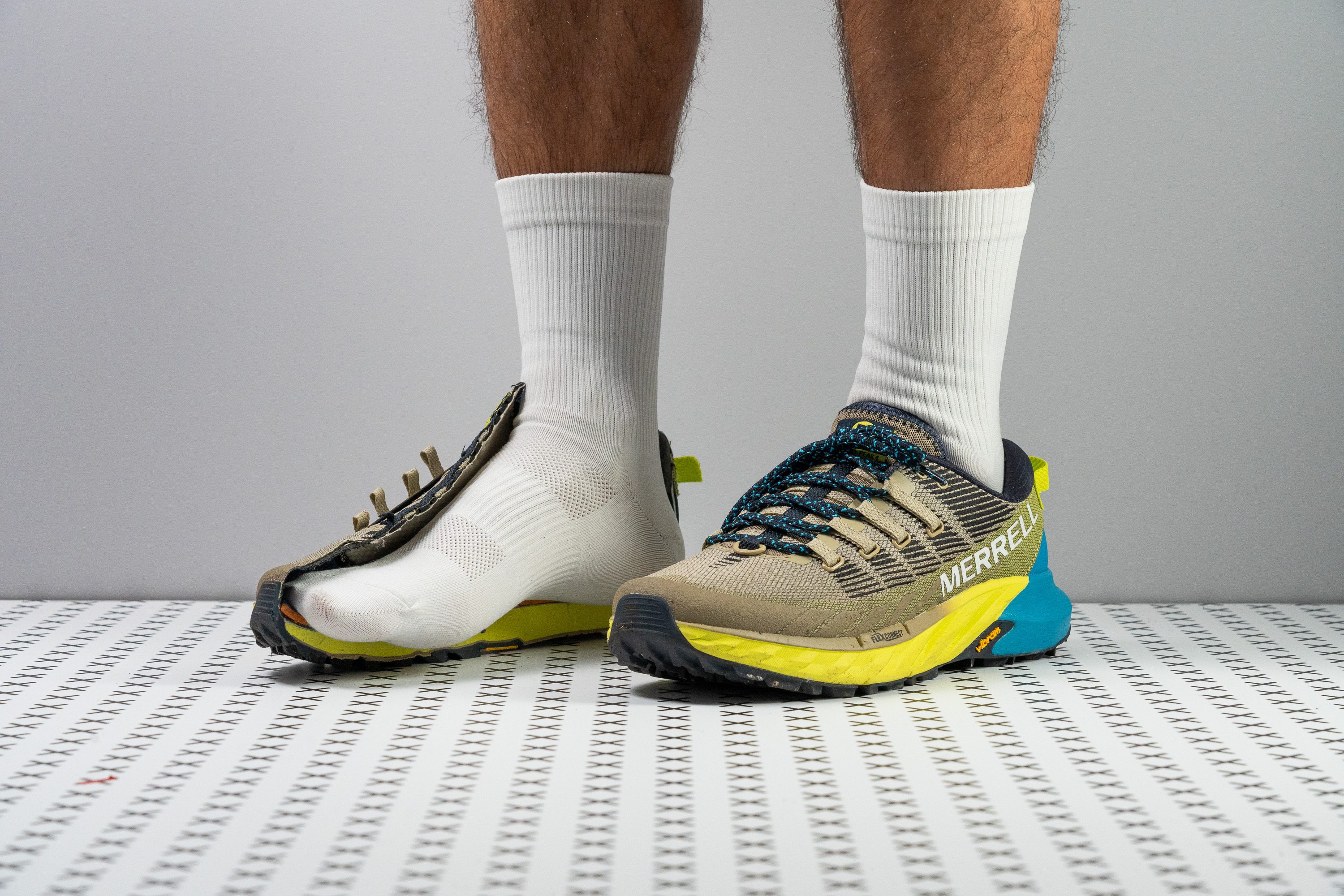Our verdict
- Top pick in best Merrell trail running shoes (2023)
Pros
- Really stable ride
- Excellent for winter weather
- Thrives in muddy conditions
- Lugs excel uphill and downhill
- Doubles as hiking shoe
- Ample stack height for heel strikers
- Upper fits most types of feet
Cons
- Lackluster durability
- Average-at-best breathability
- Actual drop differs from 6 mm
Audience verdict
Comparison
The most similar running shoes compared
+ + Add a shoe | |||||
|---|---|---|---|---|---|
| Audience score | 86 Good! | N/A | 78 Decent! | 83 Good! | |
| Price | $130 | $150 | $155 | $60 | |
| Trail terrain | Technical | ModerateTechnical | Moderate | Moderate | |
| Shock absorption | - | Moderate | Moderate | - | |
| Energy return | - | Low | Low | - | |
| Traction | - | High | - | - | |
| Arch support | Neutral | Neutral | Neutral | Neutral | |
| Weight lab Weight brand | 10.3 oz / 292g 10.8 oz / 305g | 9.8 oz / 278g 9.8 oz / 278g | 9.8 oz / 278g 9.8 oz / 277g | 11.4 oz / 323g 11.4 oz / 323g | |
| Drop lab Drop brand | 9.3 mm 6.0 mm | 11.5 mm 6.0 mm | 4.9 mm 5.0 mm | 10.3 mm 10.0 mm | |
| Strike pattern | HeelMid/forefoot | Heel | Mid/forefoot | Heel | |
| Size | Slightly large | - | Slightly small | True to size | |
| Midsole softness | Balanced | Balanced | Balanced | Balanced | |
| Difference in midsole softness in cold | Small | Small | Small | Small | |
| Plate | Rock plate | Rock plate | ✗ | ✗ | |
| Toebox durability | Decent | Decent | Good | - | |
| Heel padding durability | Decent | Decent | Good | - | |
| Outsole durability | Decent | Good | Decent | - | |
| Breathability | Moderate | Moderate | Warm | Moderate | |
| Width / fit | Narrow | Medium | Medium | Narrow | |
| Toebox width | Wide | Narrow | Medium | Medium | |
| Stiffness | Stiff | Moderate | Stiff | Stiff | |
| Torsional rigidity | Stiff | Stiff | Stiff | Stiff | |
| Heel counter stiffness | Stiff | Moderate | Moderate | Stiff | |
| Lug depth | 4.4 mm | 5.0 mm | 4.0 mm | 4.2 mm | |
| Heel stack lab Heel stack brand | 34.4 mm 30.0 mm | 36.1 mm 32.0 mm | 32.1 mm 40.0 mm | 32.8 mm | |
| Forefoot lab Forefoot brand | 25.1 mm 24.0 mm | 24.6 mm 26.0 mm | 27.2 mm 35.0 mm | 22.5 mm | |
| Widths available | Normal | Normal | NormalWide | Normal | |
| For heavy runners | ✗ | ✗ | ✓ | ✗ | |
| Season | All seasons | All seasons | All seasons | All seasons | |
| Removable insole | ✓ | ✓ | ✓ | ✓ | |
| Orthotic friendly | ✓ | ✓ | ✓ | ✓ | |
| Ranking | #384 Bottom 43% | #58 Top 16% | #345 Bottom 9% | #270 Bottom 29% | |
| Popularity | #626 Bottom 8% | #300 Bottom 21% | #36 Top 10% | #337 Bottom 12% |
Who should buy
We highly recommend the Merrell Agility Peak 4 for:
- Trail enthusiasts seeking a stable and responsive ride without the bulk of traditional trail shoes.
- Heel strikers who appreciate the support of a firm midsole during their trail runs.
- Adventurers who need a versatile shoe for both trail running and hiking that features a Vibram outsole.
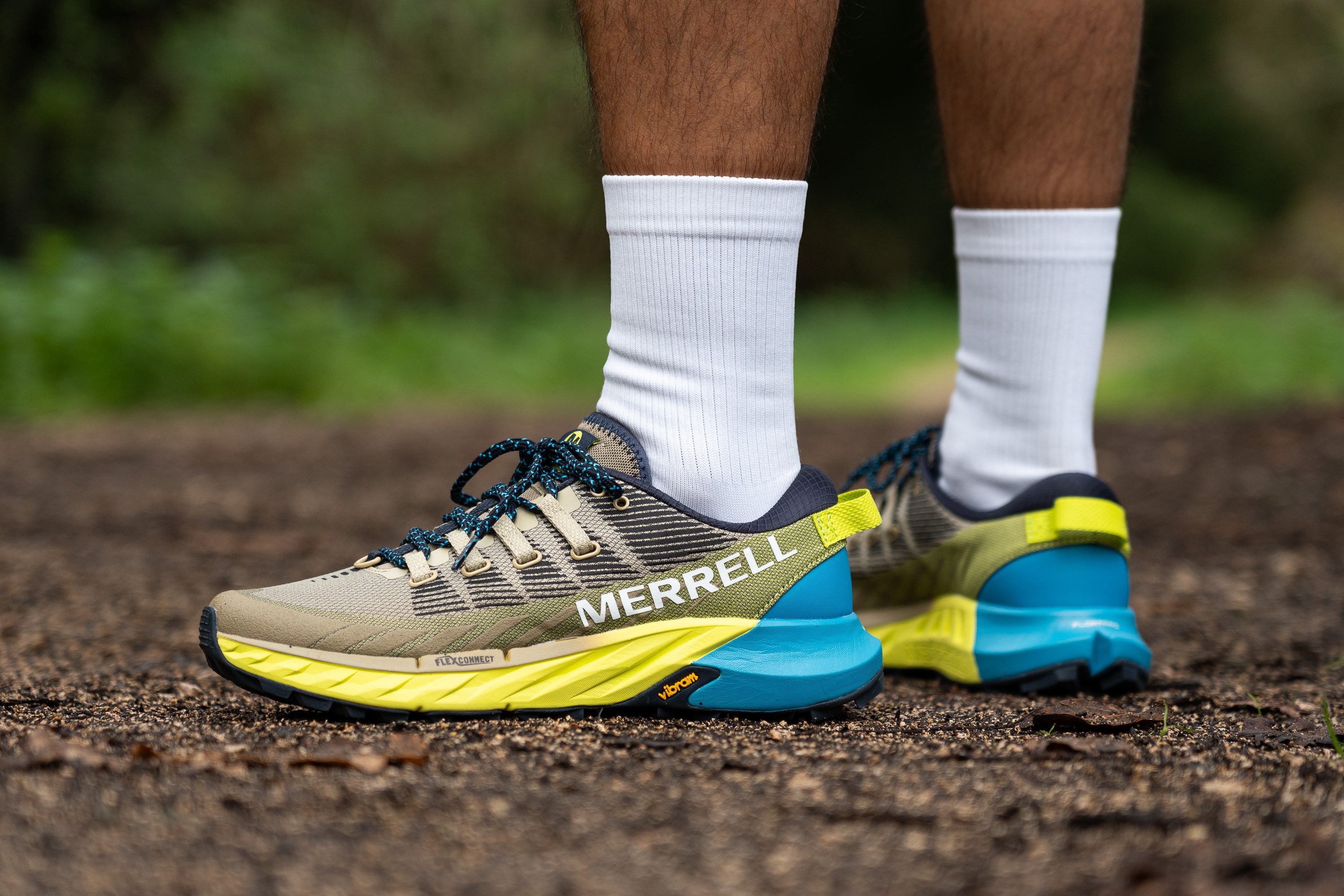
Who should NOT buy
We found the FloatPro foam in the Agility Peak 4 to be on the firm side, and the thick outsole doesn't help at all. This means if you're after a plush, soft feel underfoot, the Agility Peak 4 might not be a good pick. We think there are better choices out there, like the ASICS Trabuco Max 2, if you're seeking a comfortable, cloud-like ride.
In our lab tests, we also noticed that the shoe lacks durability, particularly in the toebox, heel, and outsole. Fortunately, the newer version, the Merrell Agility Peak 5, seems to address many of the predecessor's issues. Based on our findings, we recommend considering the upgrade for a better experience.
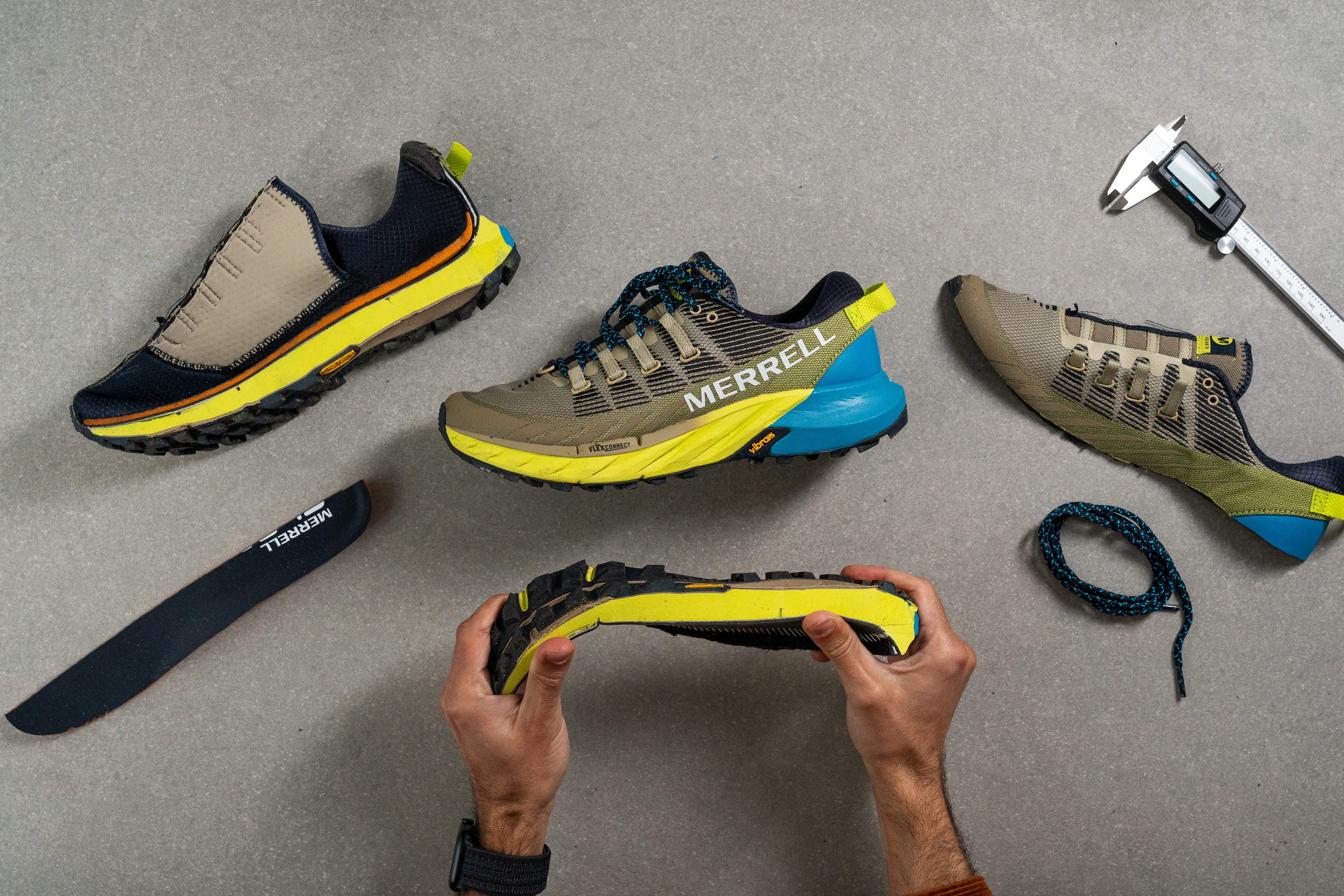
Cushioning
Heel stack
Let's measure the stack height to get a clear picture of what we're dealing with.
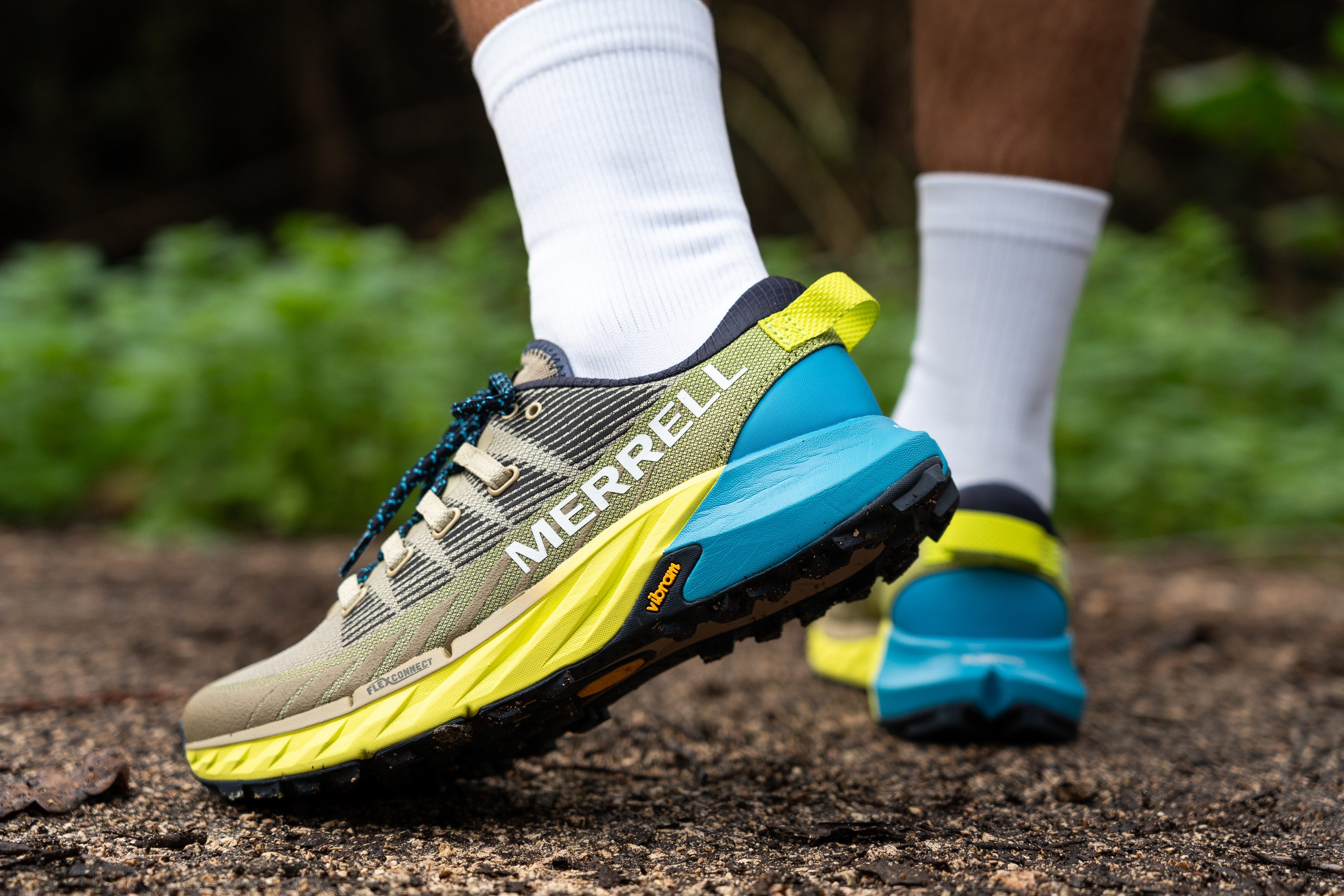
Our digital caliper showed 34.4 mm in the heel, indicating that this shoe can comfortably accommodate heel strikers.
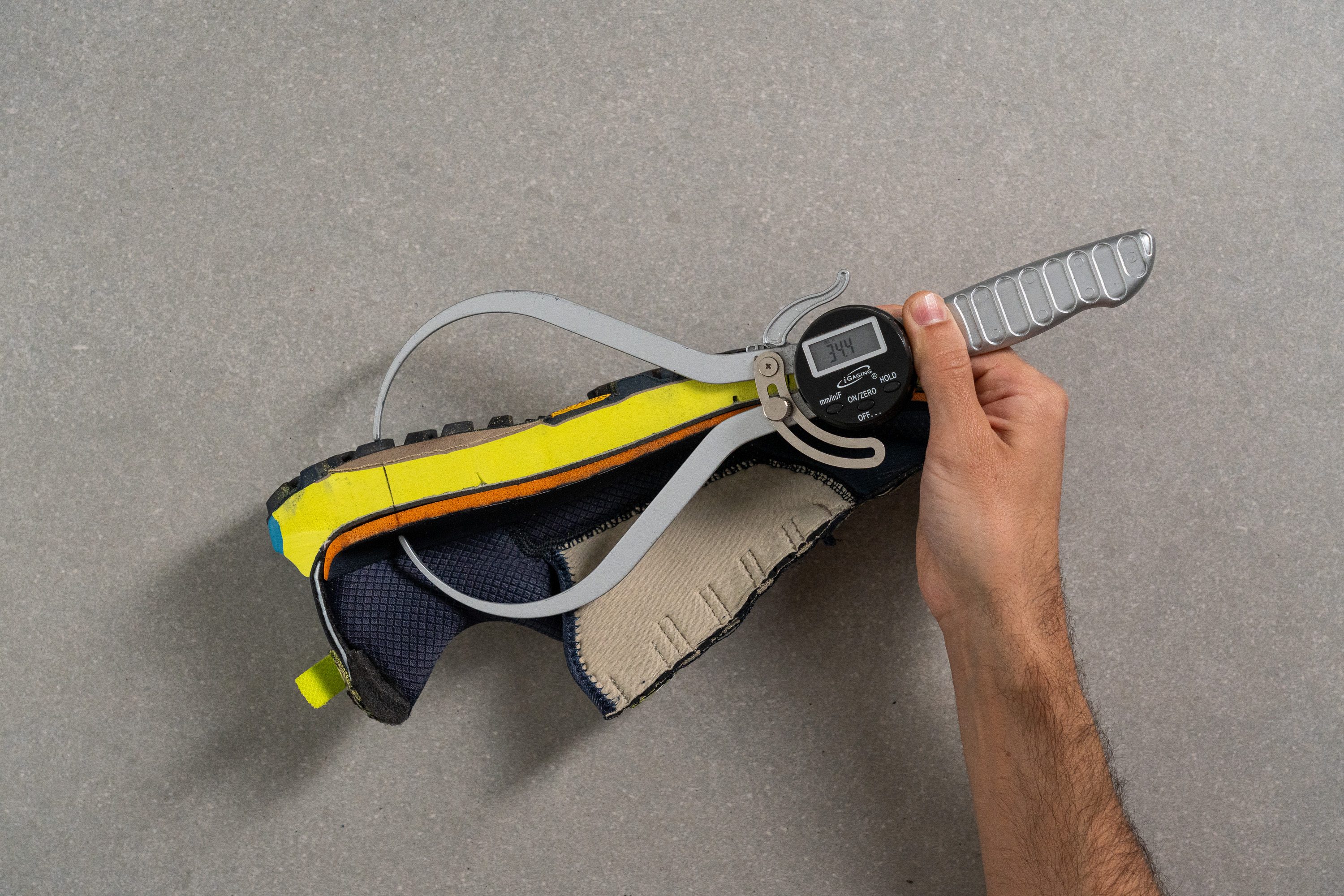
| Agility Peak 4 | 34.4 mm |
| Average | 32.6 mm |
Forefoot stack
We measured the forefoot too, finding a thickness of 25.1 mm. This measurement seems pretty standard, making this shoe a great all-rounder for various distances.
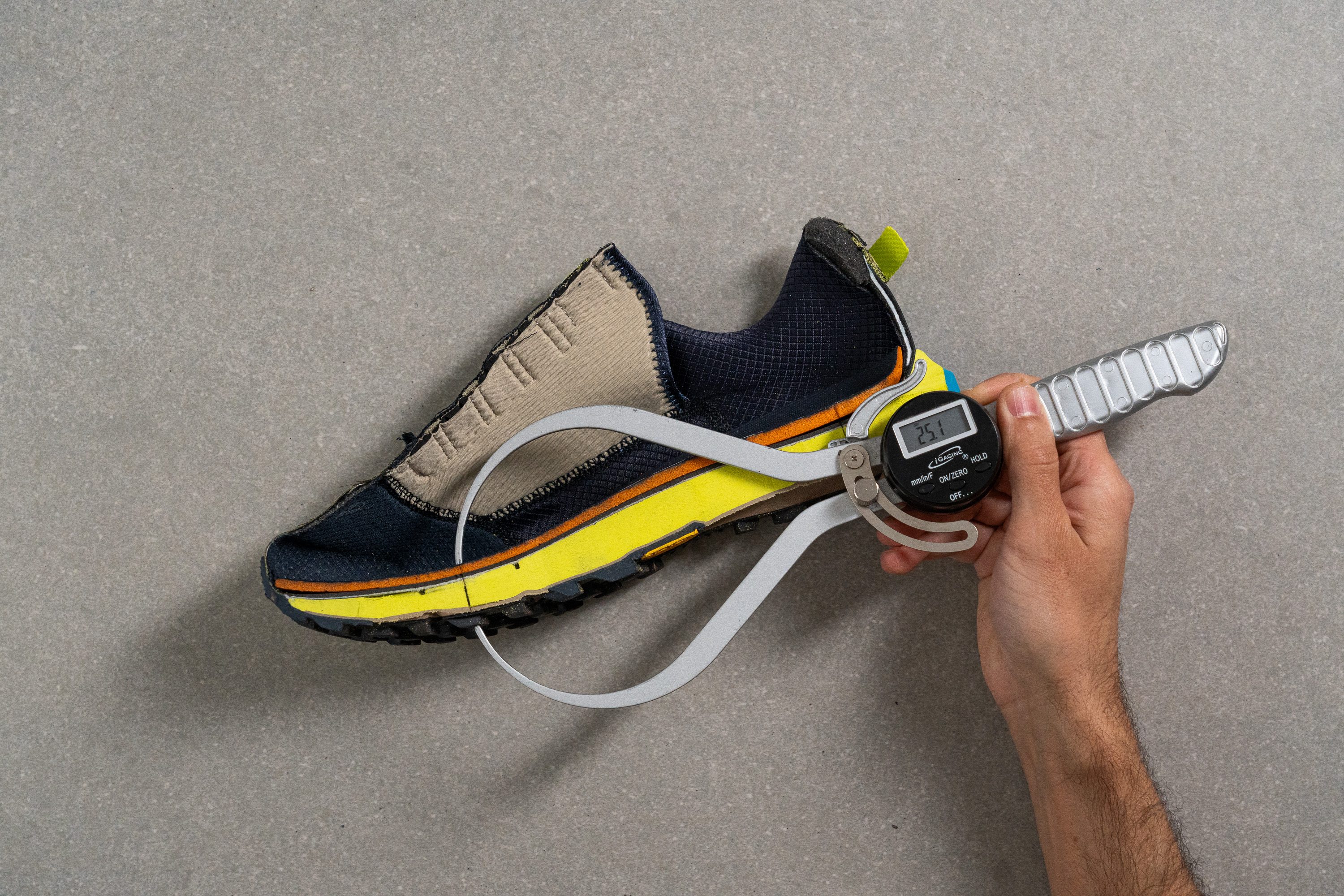
| Agility Peak 4 | 25.1 mm |
| Average | 25.1 mm |
Drop
In the lab, we measured the drop—the difference between the heel and forefoot height—at 9.3 mm. This differs from the 6-mm offset claimed by the brand, making the shoe more suitable for heel strikers.
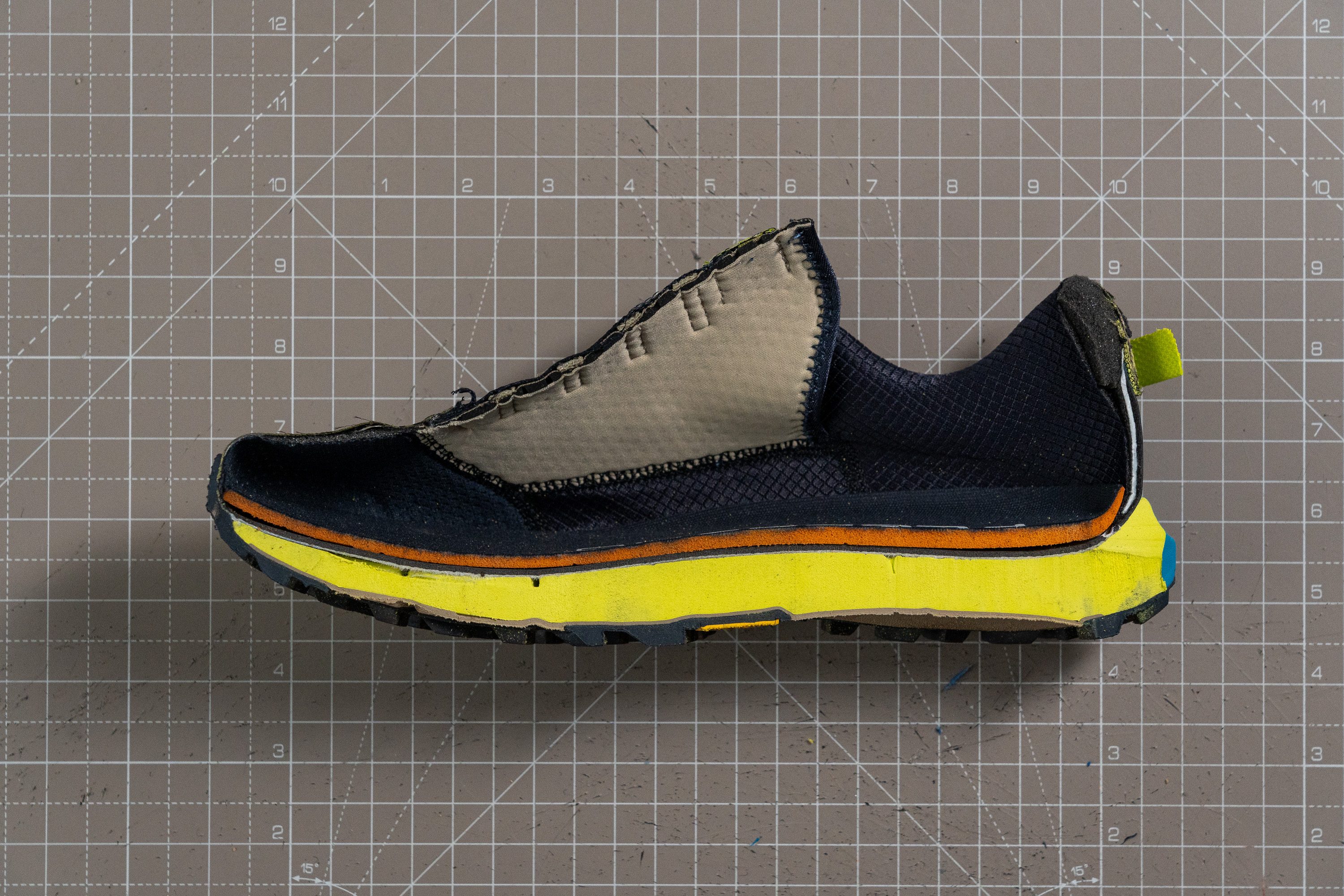
| Agility Peak 4 | 9.3 mm |
| Average | 7.6 mm |
Midsole softness
Despite the thick insole and a decently cushioned midsole, the ride feels firm. We noticed this during our test runs and confirmed it with using our Shore A Durometer on the FloatPro foam.
The result of 29.9 HA makes this trail shoe a good choice for those who prefer a stable, secure ride and don't mind sacrificing some plushness underfoot.
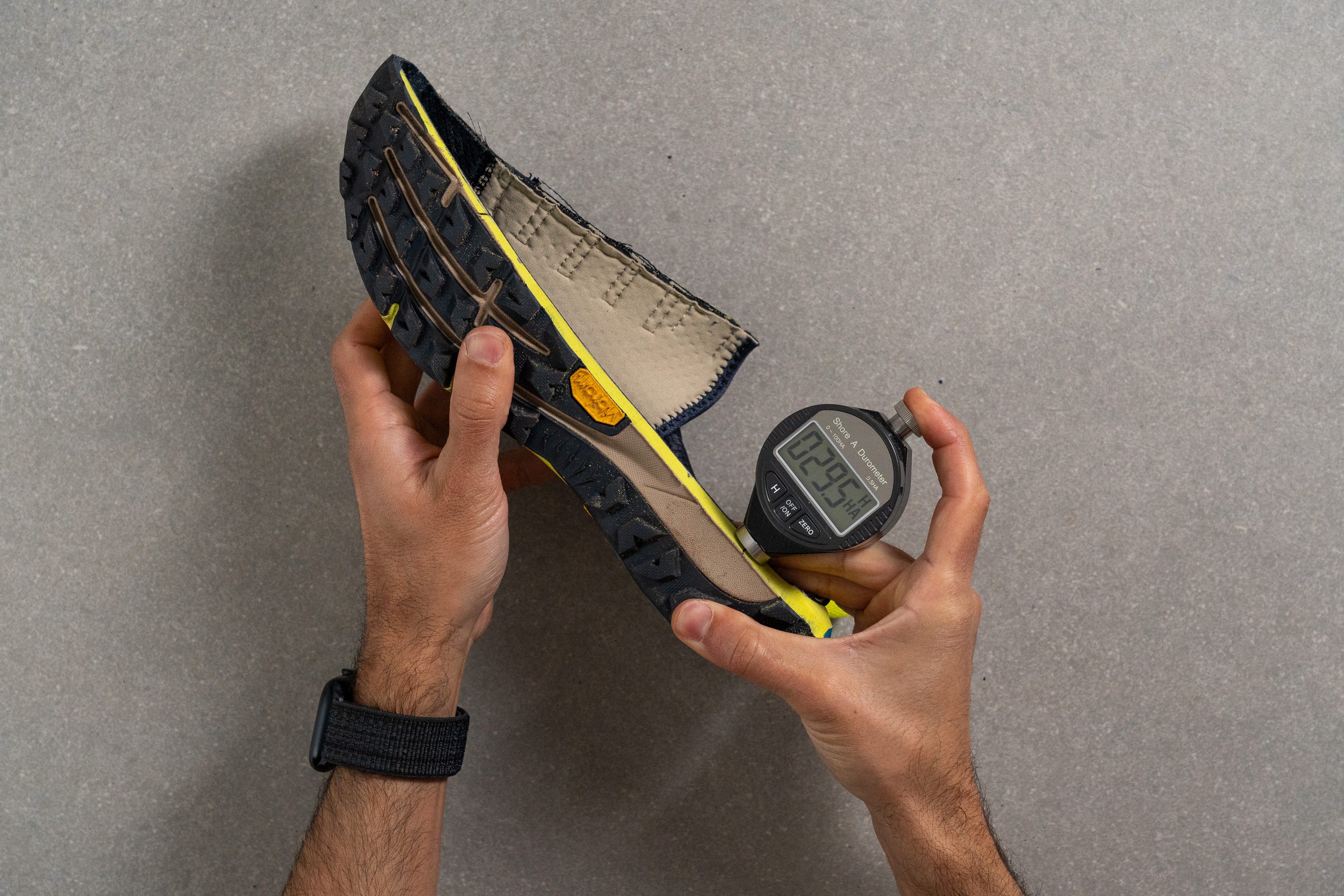
| Agility Peak 4 | 29.9 HA |
| Average | 22.0 HA |
Size and fit
Size
Merrell Agility Peak 4 fits slightly large (16 votes).
Width / Fit
The upper has an average fit that didn't feel roomy or snug to us—it was just okay. We measured 97.6 mm in the widest part of the toebox, which confirms our impressions.
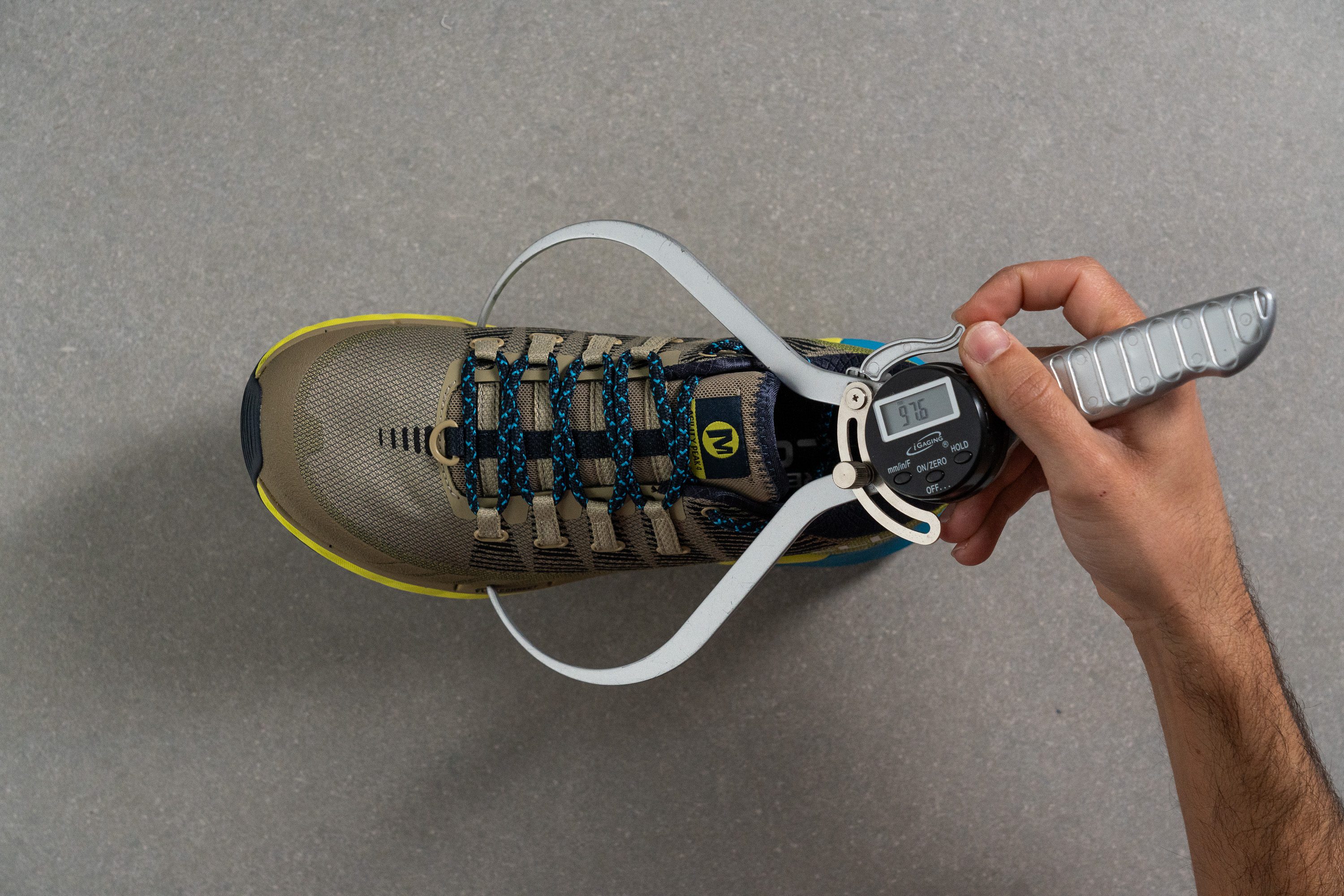
This test follows an older methodology, which is why you don't see recently tested shoes in the chart. Results from different methodologies can not be compared.
| Agility Peak 4 | 97.6 mm |
| Average | 98.9 mm |
Toebox width
However, with 80.1 mm in the big toe area, we're happy to confirm there's a bit more room for your toes to wiggle!
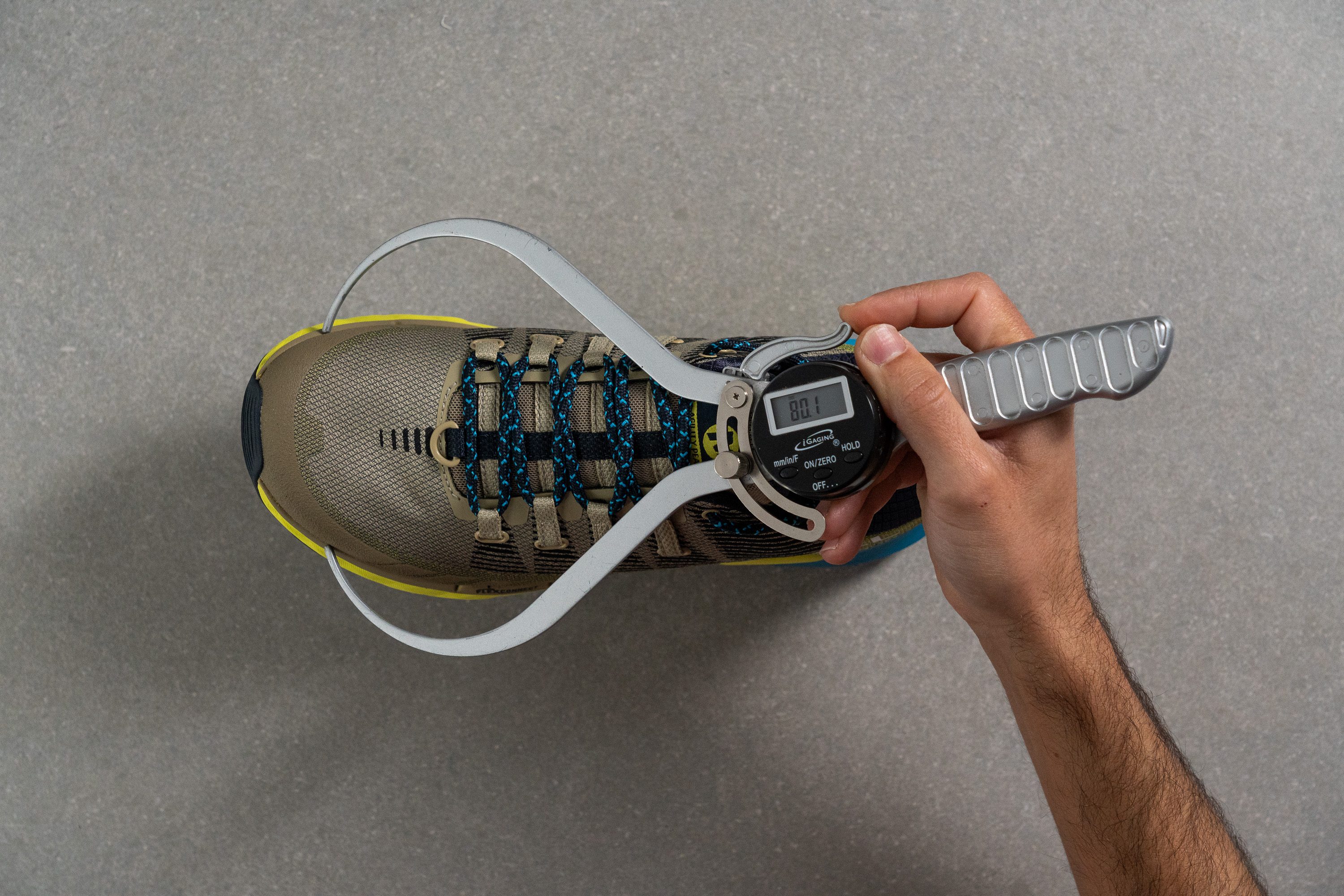
This test follows an older methodology, which is why you don't see recently tested shoes in the chart. Results from different methodologies can not be compared.
| Agility Peak 4 | 80.1 mm |
| Average | 79.3 mm |
Traction / Grip
Lug depth
Back to the outsole, we found 4.4-mm chevron-shaped lugs designed to improve traction in muddy or wet conditions.
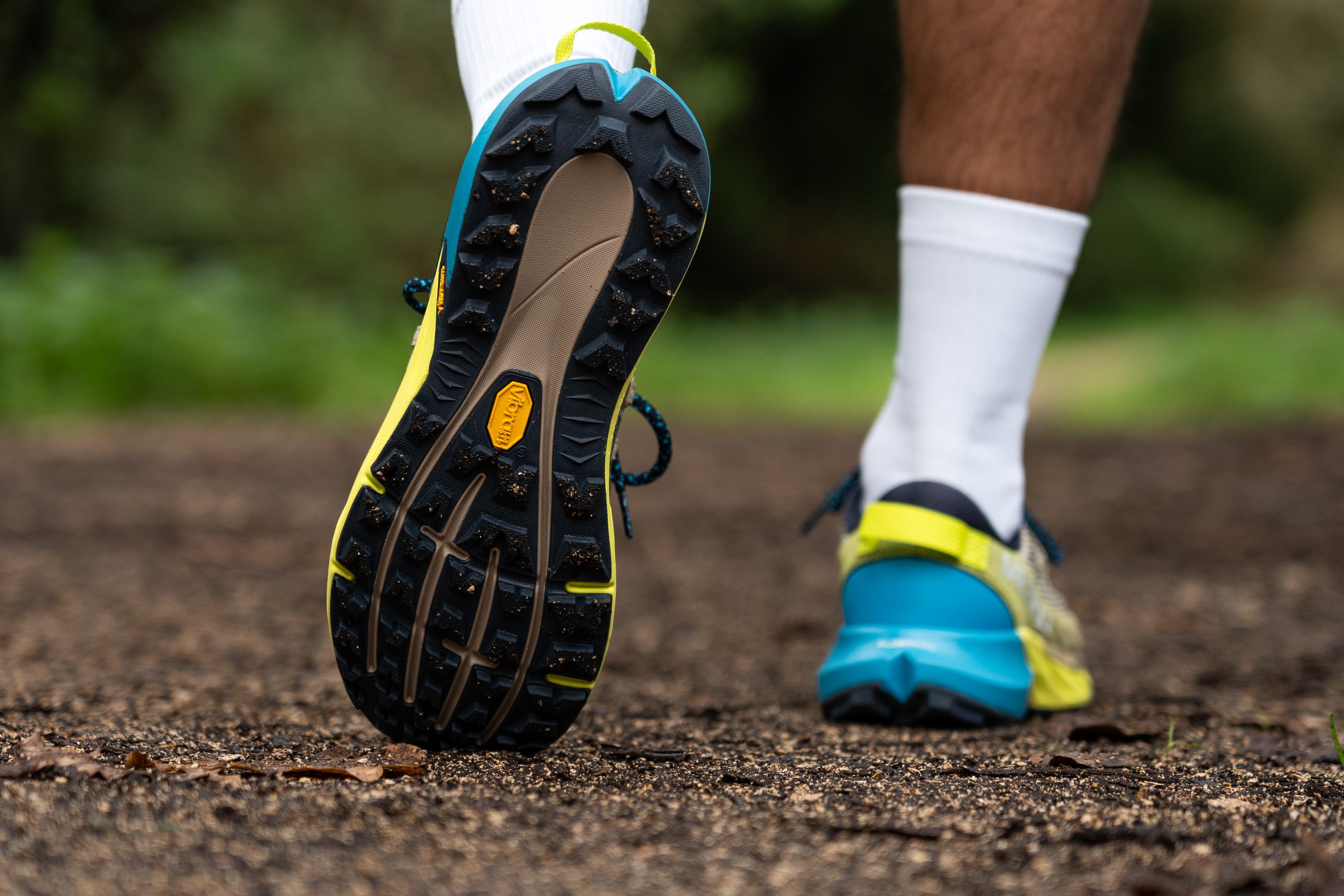
This lug length seems adequate to us since it can handle most terrains. However, combined with the 3.0-mm base, it results in a very muted ride that feels really bad in roads, with a total height of 7.4 mm for the entire Vibram outsole. Stick to the trails, please.
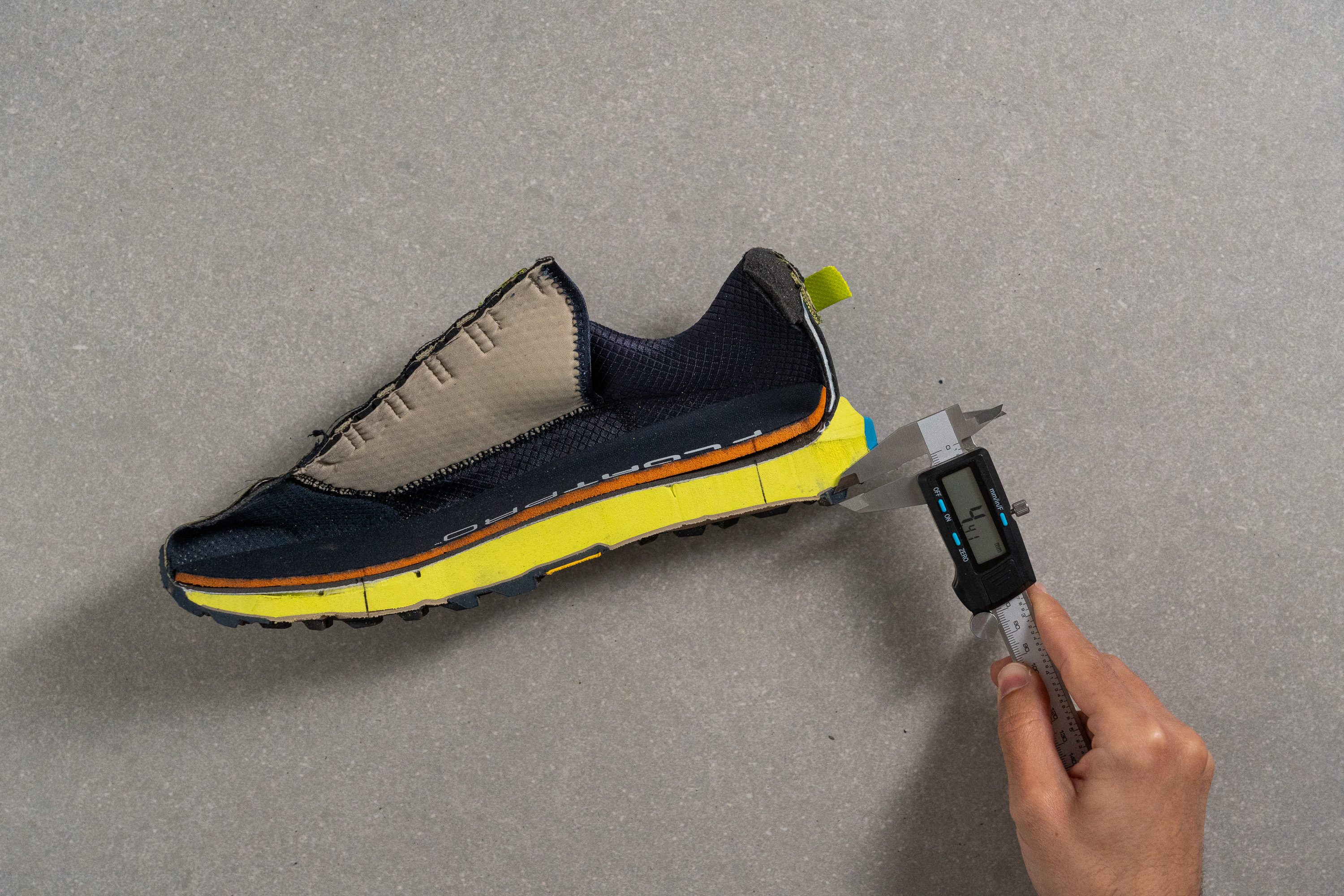
| Agility Peak 4 | 4.4 mm |
| Average | 3.5 mm |
Flexibility / Stiffness
We previously discovered the Agility Peak 4 to be super rigid in our manual assessment, which made us eager to test it with our force gauge. Finding the same rigidity from a longitudinal perspective wouldn't be ideal for those looking to use this shoe for easy runs or hikes.
Luckily, it turned out to be much more flexible, probably thanks to the FlexConnect system in the midsole. We recorded a 29.7N result after bending the shoe to 90 degrees—a fairly average outcome.
This test follows an older methodology, which is why you don't see recently tested shoes in the chart. Results from different methodologies can not be compared.
| Agility Peak 4 | 29.7N |
| Average | 27.1N |
Stiffness in cold (%)
We repeated the 20-minute freezer test with the stiffness measurement, and the AP4 was 24.2% firmer this time. It's not a significant difference, and we believe most runners probably won't even notice.
| Agility Peak 4 | 24% |
| Average | 32% |
Weight
The Merrell Agility Peak 4 isn't a small, thin shoe, yet it doesn't feel too heavy.
On our scale, it weighed in at 10 oz, which is about average for shoes with similar cushioning. We're pleased with this result!
| Agility Peak 4 | 10.3 oz (292g) |
| Average | 10.2 oz (289g) |
Breathability
Our first impression of the Agility Peak 4 was that the toebox seemed to lack airflow due to its dense structure and absence of ventilation holes. We decided to put it to the test with our smoke-pumping machine.
As expected, the results showed minimal airflow in the toebox area. Merrell did design the tongue to allow some heat and vapor to escape, which earned the shoe a 3/5 in our test.
When we assessed the shoe over the light, it confirmed the lack of ventilation through the engineered mesh. This doesn't necessarily mean it's a flaw—it just makes the shoe less suitable for hot summer runs but a solid choice for winter.
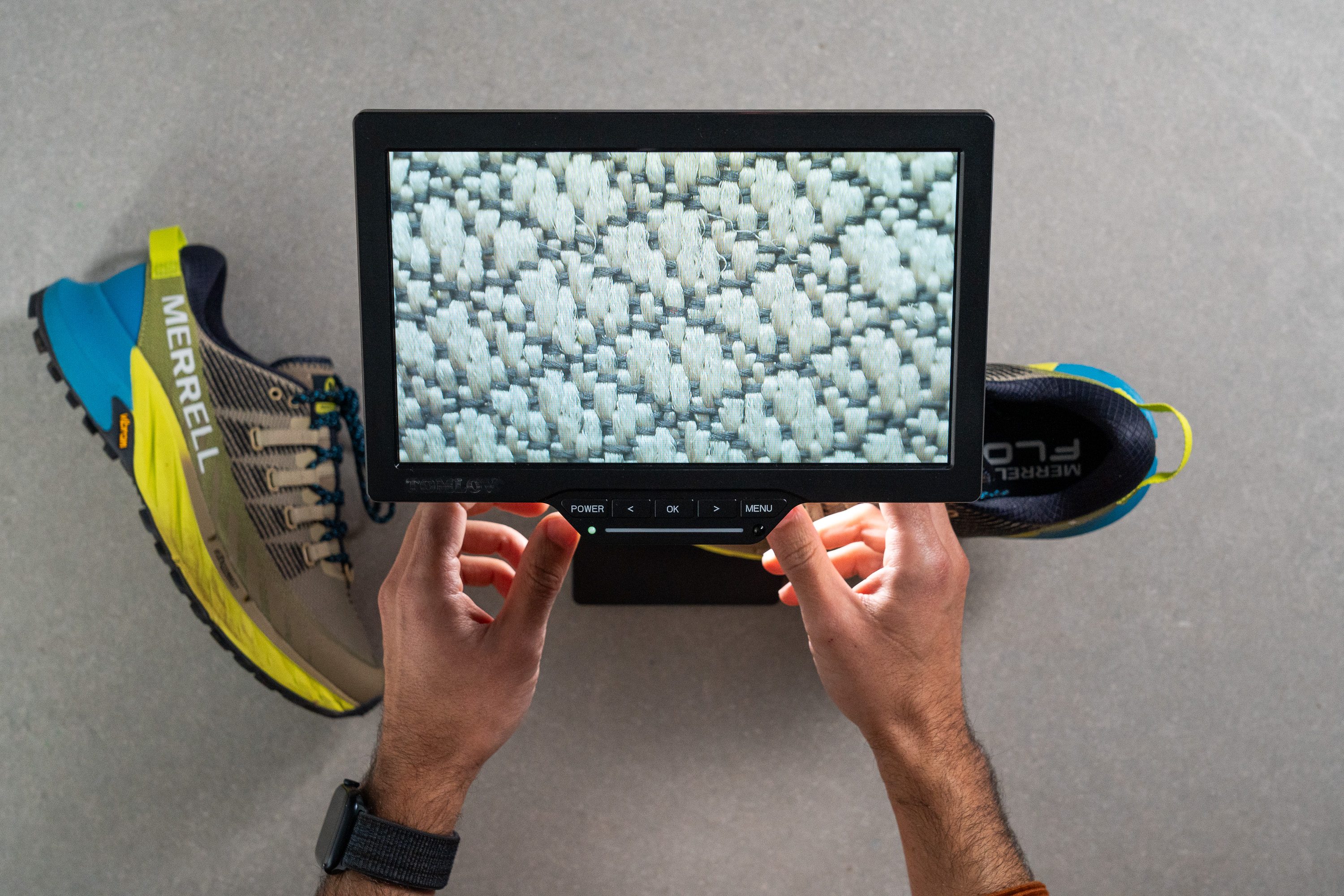
To understand why the toebox doesn't allow air through, we headed to the microscope zone in the lab.
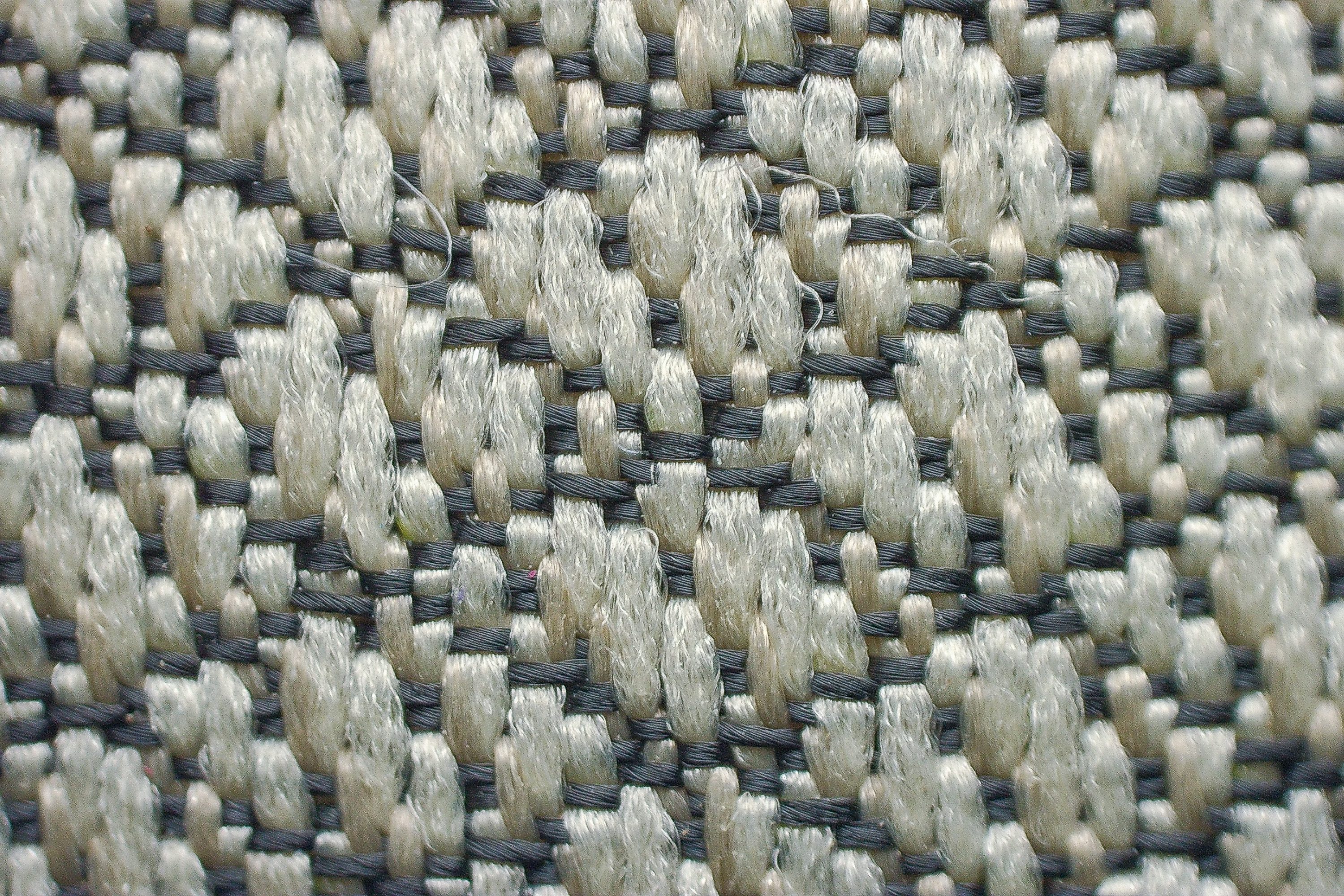
There, we confirmed our suspicions: the material is indeed very dense with no holes at all.
The upper does have decent padding, though. We believe it could even handle ultras, but based on our tests, we'd suggest skipping summer events with this shoe.
| Agility Peak 4 | 3 |
| Average | 3.3 |
Stability
Lateral stability test
Having a firm midsole naturally makes a shoe stable, but the Merrell Agility Peak 4 felt even more stable than its firmness alone would suggest—there must be something else, right?
Indeed, one of the key features is the midsole sidewalls, which guide the foot forward and prevent lateral collapse. But there's more to it.
Torsional rigidity
Another key factor in the shoe's stable ride, making it suitable even for runners with stability needs, is its impressive rigidity.
We really struggled to bend the shoe, earning it a 5/5 score—a rating usually reserved for carbon-plated shoes. The downside could be some discomfort on easy runs and technical terrain. So, if you're often facing sharp turns and descents, you might find the Hoka Zinal 2 a better fit.
| Agility Peak 4 | 5 |
| Average | 3.6 |
Heel counter stiffness
The heel counter is also quite stiff, scoring a 4/5 in our assessment. This design is aimed at enhancing stability, though those with sensitivity to rigid heel counters might find it a bit too much.
| Agility Peak 4 | 4 |
| Average | 3 |
Midsole width - forefoot
Our first measurement of the shoe's dimensions was in the widest part of the forefoot, which we recorded at 109.8 mm.
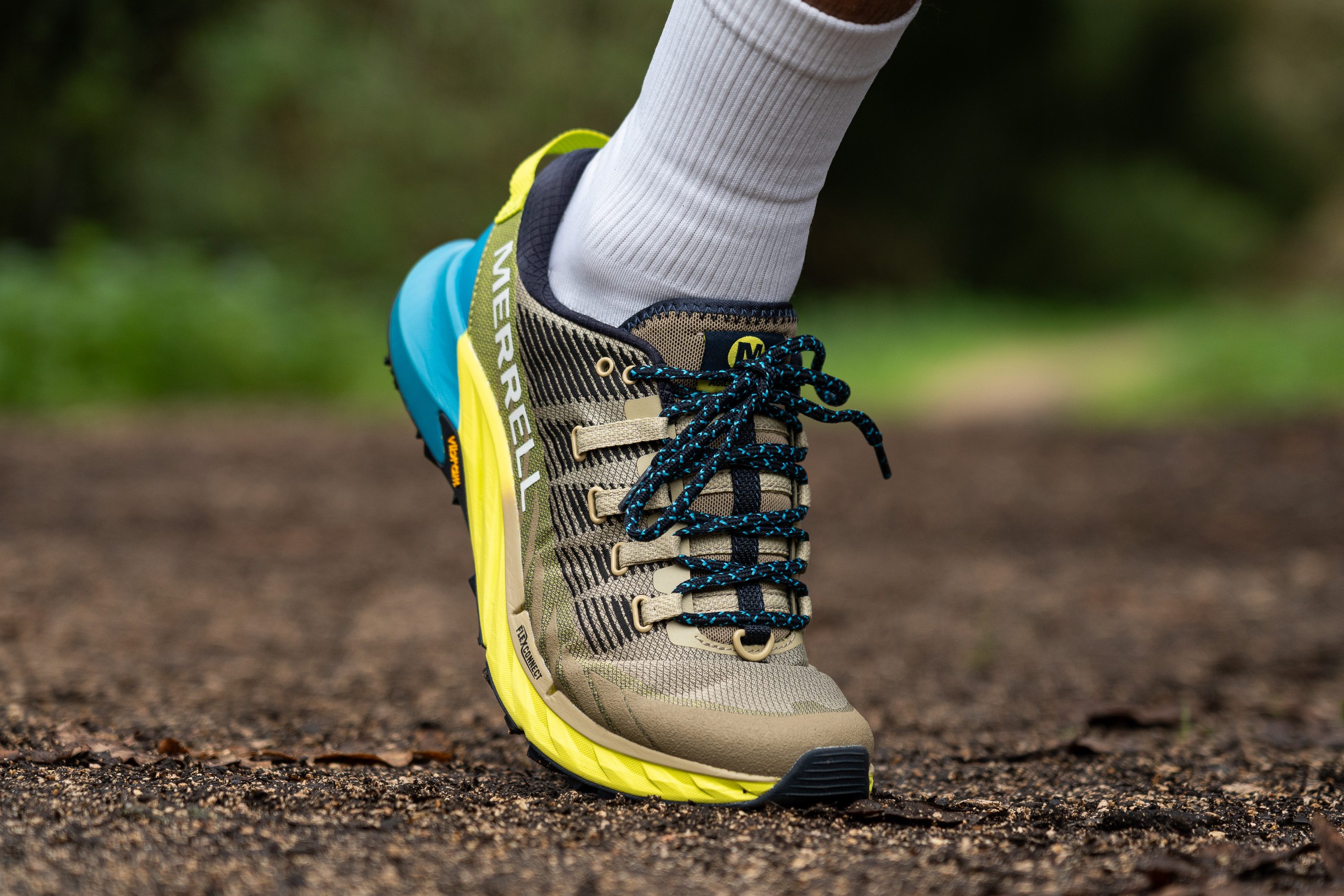
It's not very wide, but now everything makes sense—to achieve a stable ride in a moderately narrow shoe, other features must be implemented, as we demonstrated earlier with the torsional rigidity and the stiff heel counter.
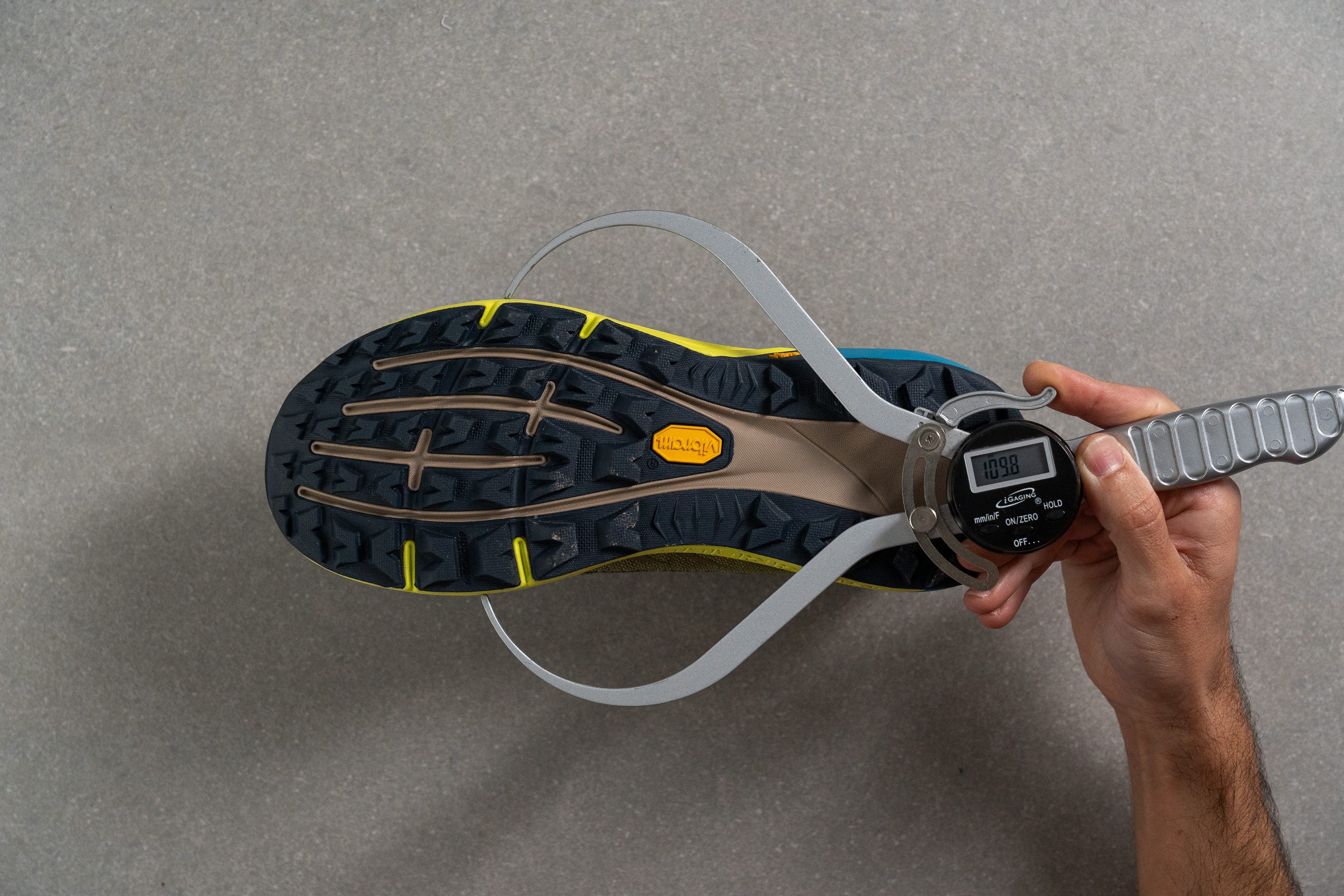
| Agility Peak 4 | 109.8 mm |
| Average | 112.8 mm |
Midsole width - heel
The heel is comparatively wider, measuring 91.0 mm. This makes sense since the shoe's design favors heel strikers based on its geometry.
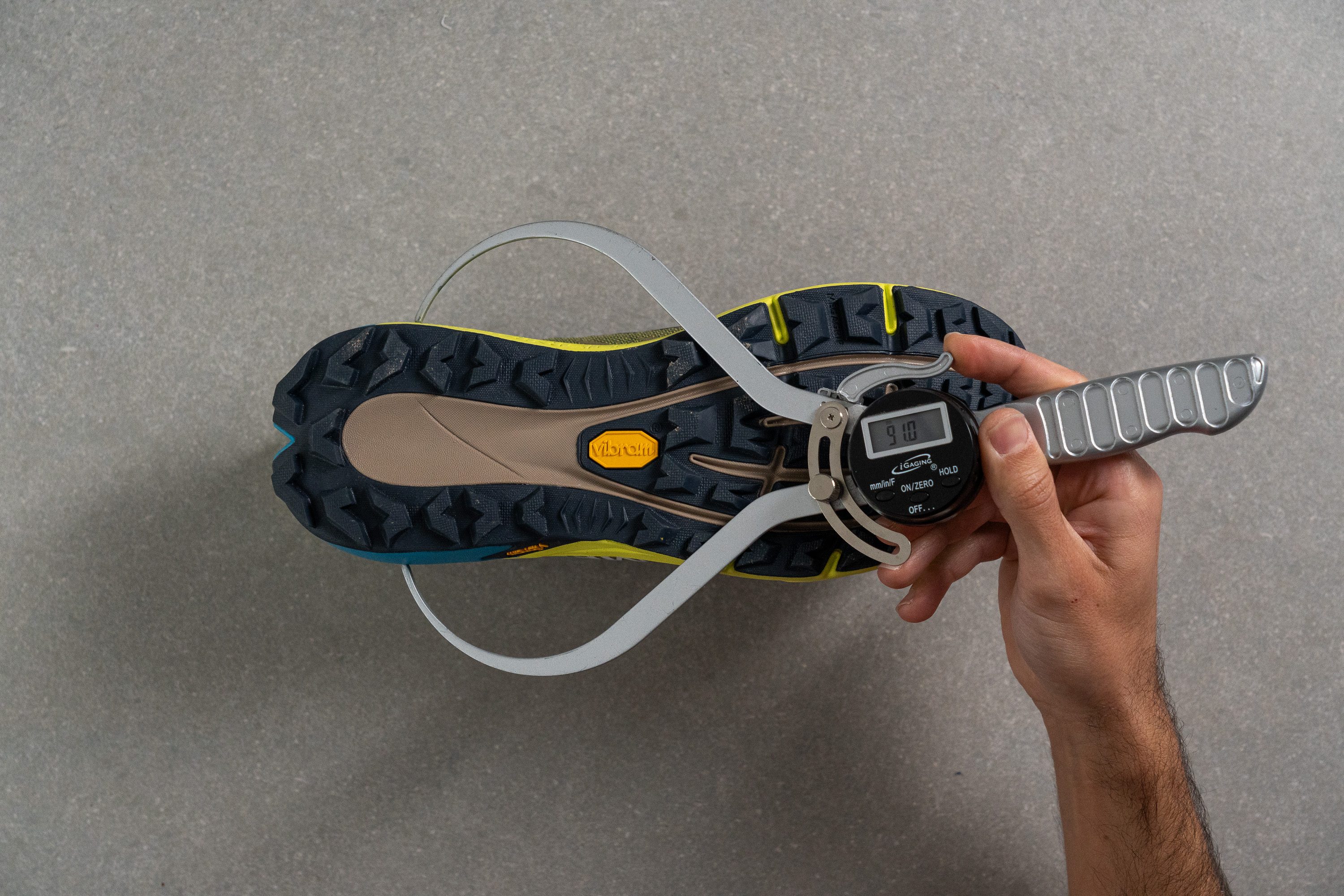
| Agility Peak 4 | 91.0 mm |
| Average | 89.9 mm |
Durability
Toebox durability
One common advantage of thick and dense uppers is better durability. That's why we were keen to test the Agility Peak 4.
However, the results didn't meet our expectations. Although a 3/5 is decent, we thought a really dense upper like this one would do slightly better. Plus, Merrell didn't add significant protective pieces to the toebox—only some coverage on the toecap.
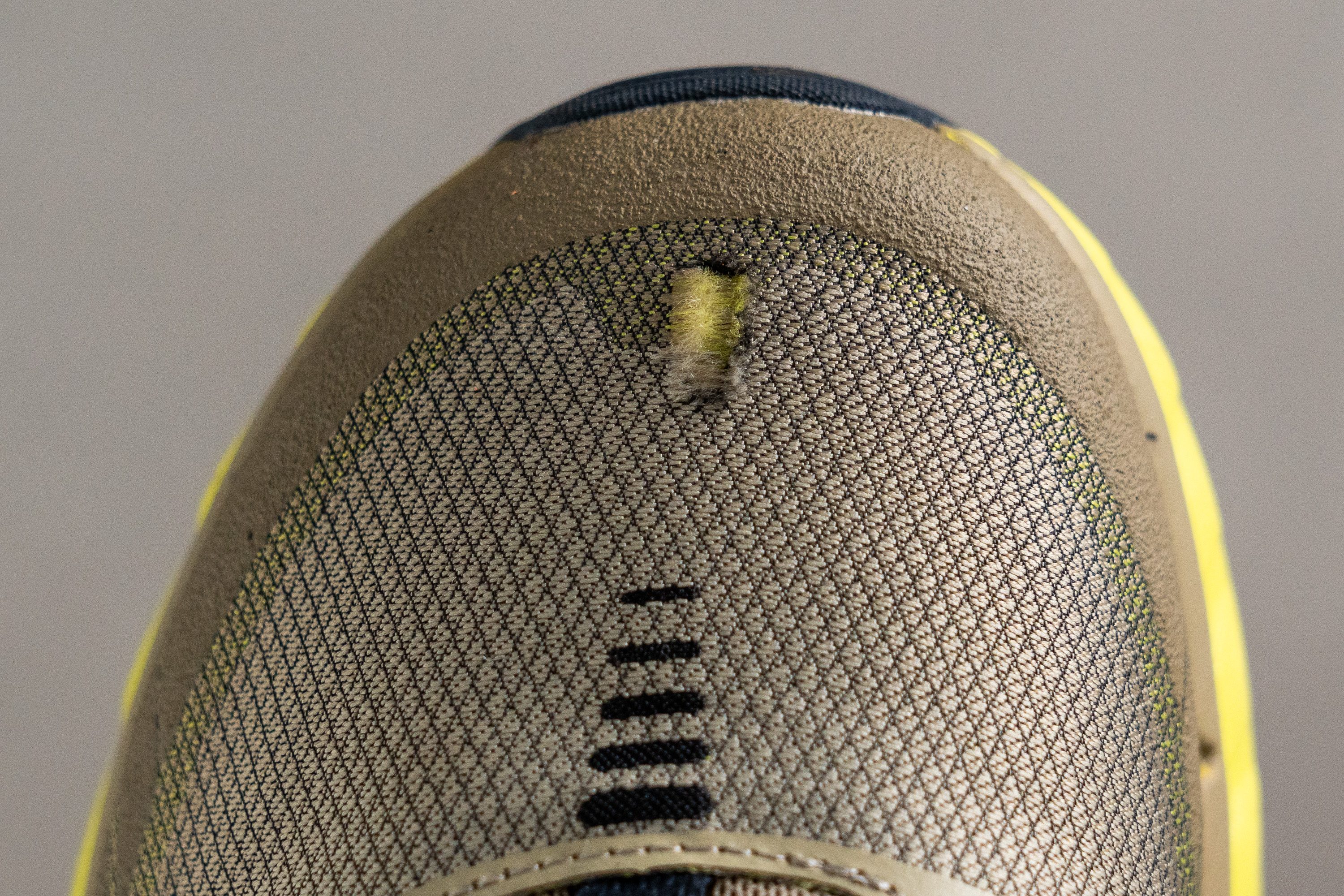
| Agility Peak 4 | 3 |
| Average | 3.1 |
Heel padding durability
We took our Dremel to the heel padding area and were disappointed with a 2/5 score, a step down from before.
This is concerning for those who tend to wear the Achilles area of running shoes.
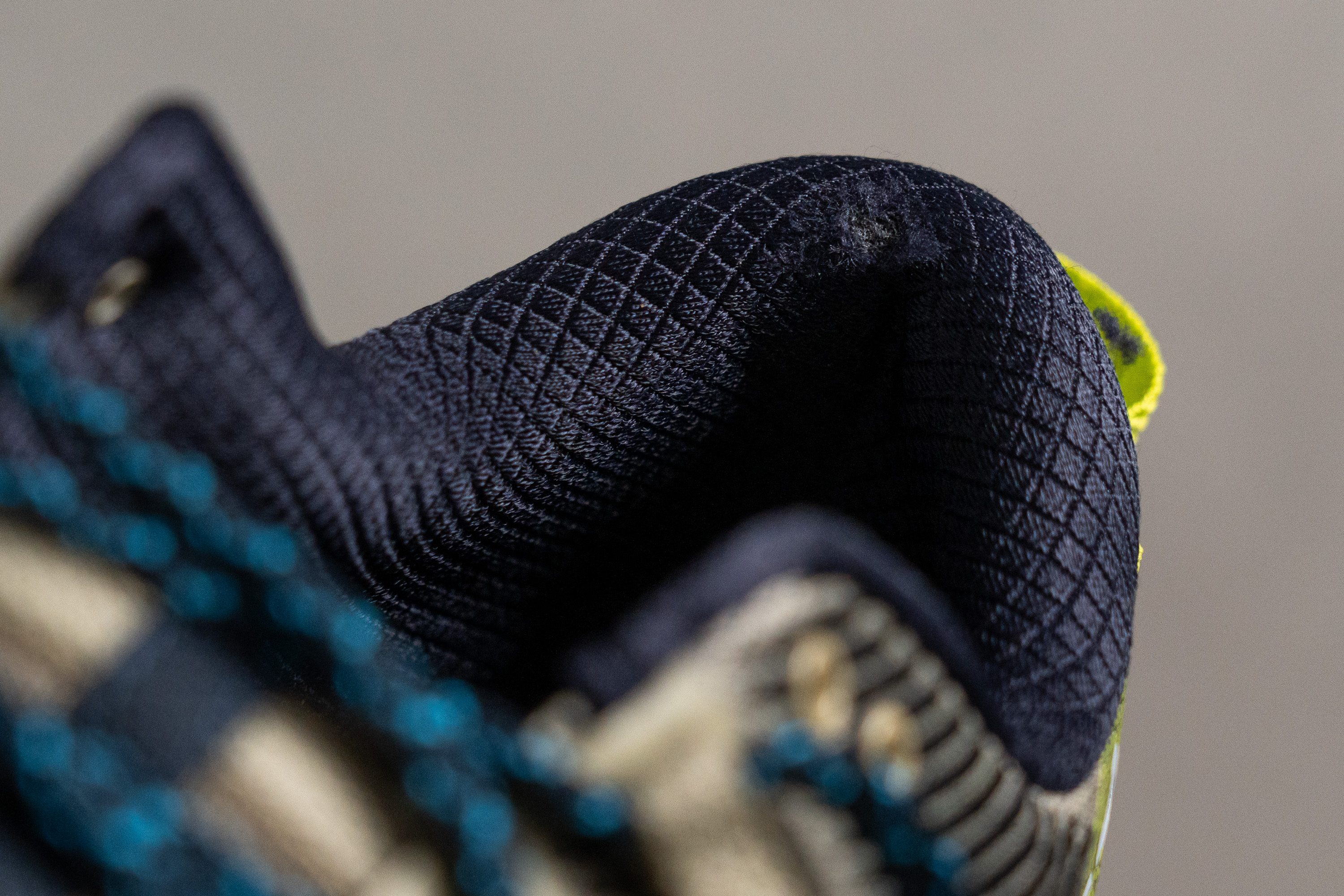
| Agility Peak 4 | 2 |
| Average | 3 |
Outsole hardness
Hoping for better results with the outsole, we checked the hardness of the Vibram rubber.
Our durometer showed 88.4 HC, indicating it's quite hard and should presumably lead to positive results in our next test.
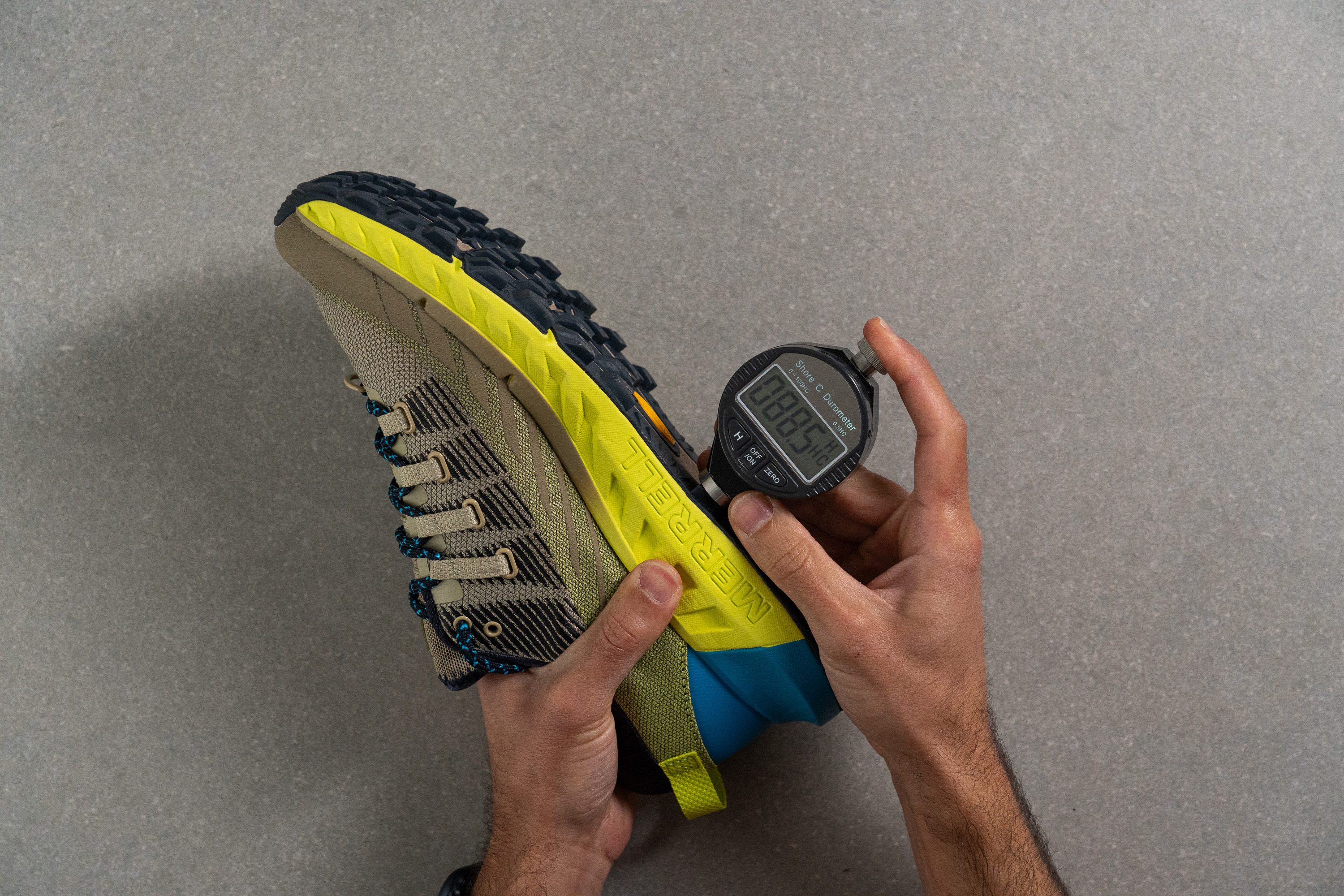
| Agility Peak 4 | 88.4 HC |
| Average | 85.8 HC |
Outsole durability
For our final Dremel test, we revved up the Dremel and crossed our fingers.
Sadly, the hard Vibram rubber also fell short, hinting that durability might be the Agility Peak 4's major flaw. We noticed a 1.8-mm indentation, which is just too deep.
Then it clicked for us. This isn't the highly praised Megagrip from Vibram, but the Eco-Step Evo—a rubber that doesn't perform as well.
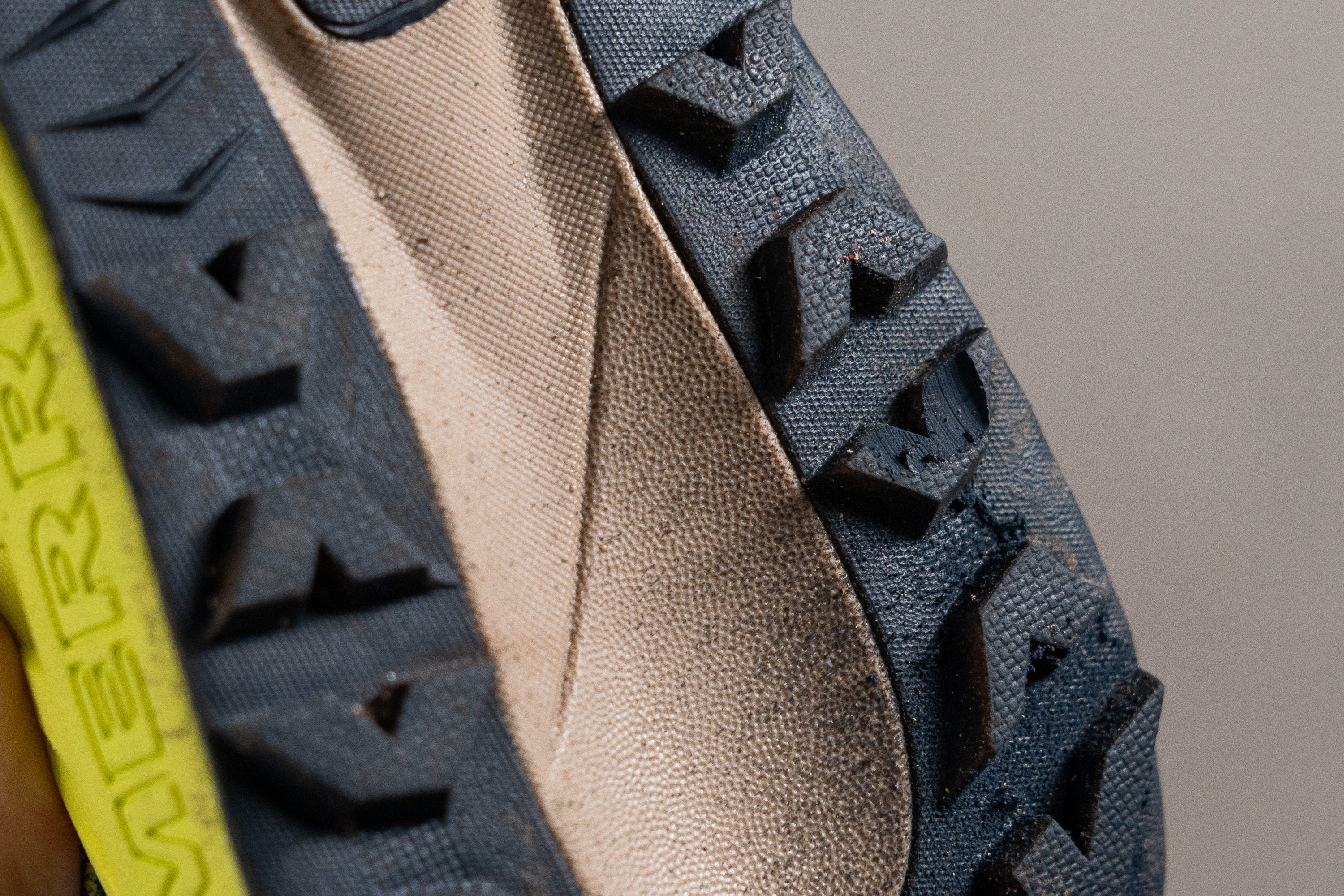
| Agility Peak 4 | 1.8 mm |
| Average | 0.9 mm |
Outsole thickness
At least Merrell equipped the AP4 with a thick, 3.0-mm rubber layer, which complements the lugs we'll discuss shortly in this same review.
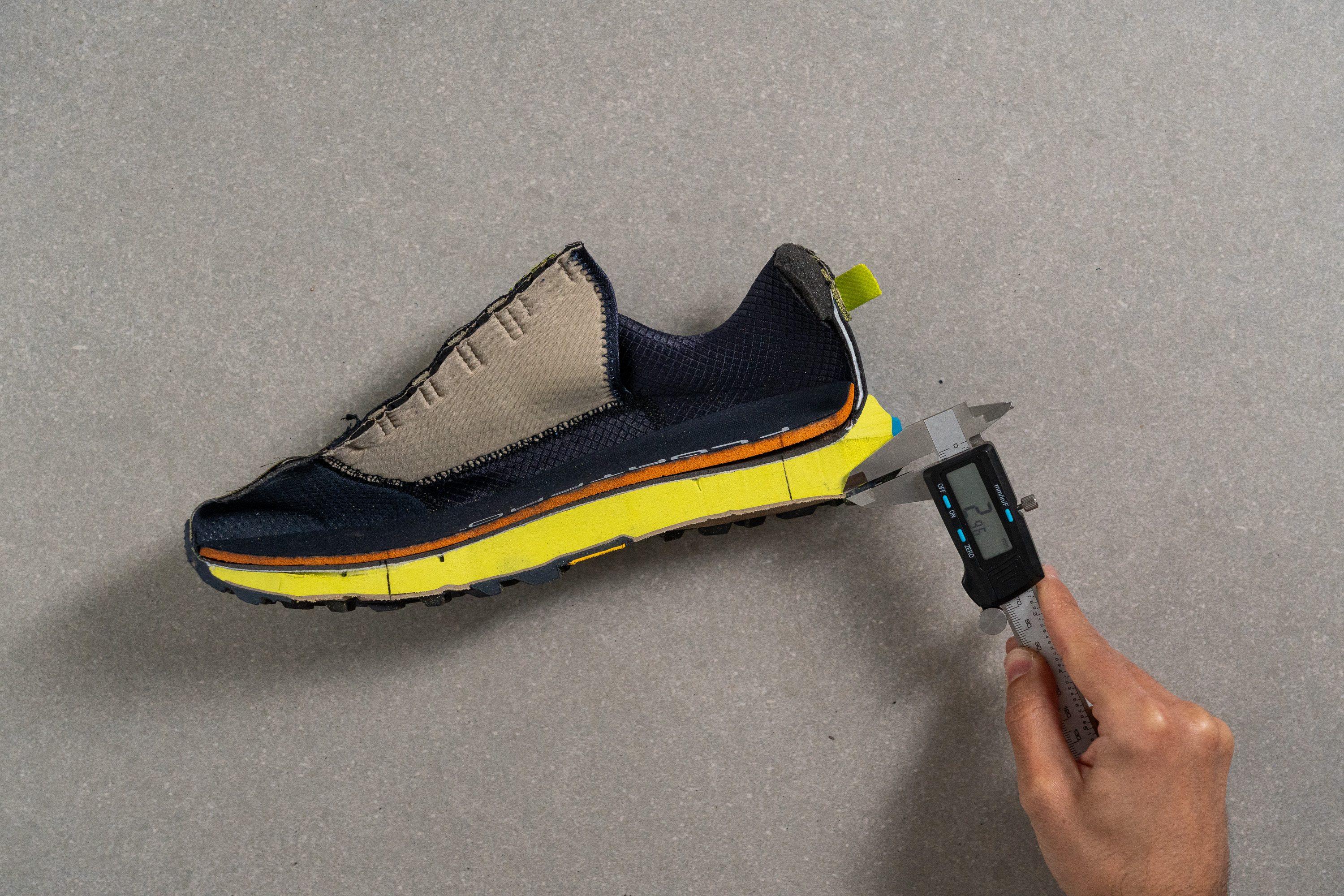
| Agility Peak 4 | 3.0 mm |
| Average | 2.2 mm |
Misc
Insole thickness
A simple way for brands to enhance underfoot comfort and create a cushioned feel is by adding a thicker-than-average insole to the shoe.
That's exactly what Merrell did, using a very thick 5.8-mm insole.
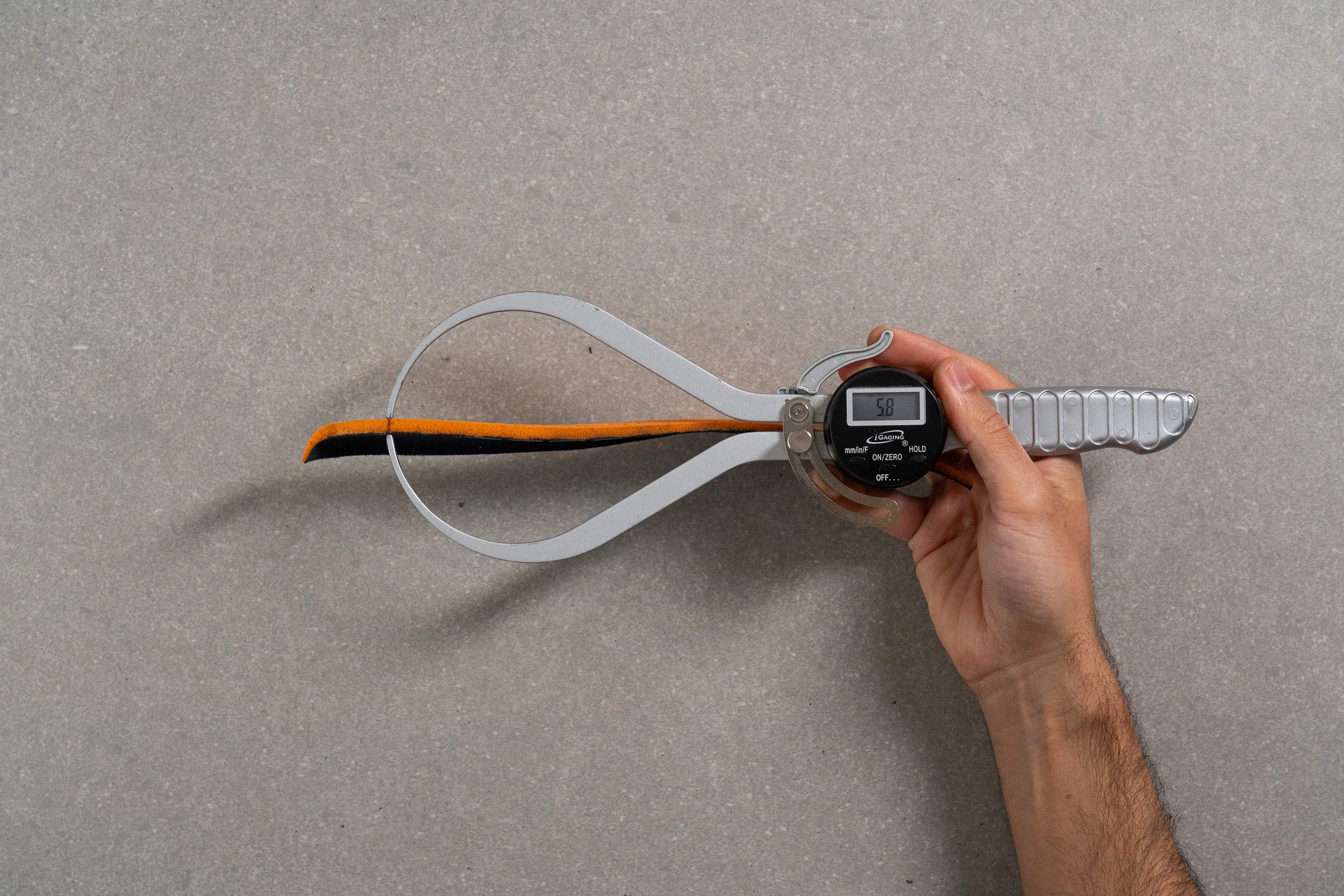
| Agility Peak 4 | 5.8 mm |
| Average | 4.7 mm |
Removable insole
The insole is removable because it isn't glued to the strobel board. It also has a super-big FloatPro logo, so you won't forget the firm-like-a-brick foam Merrell used in this shoe.
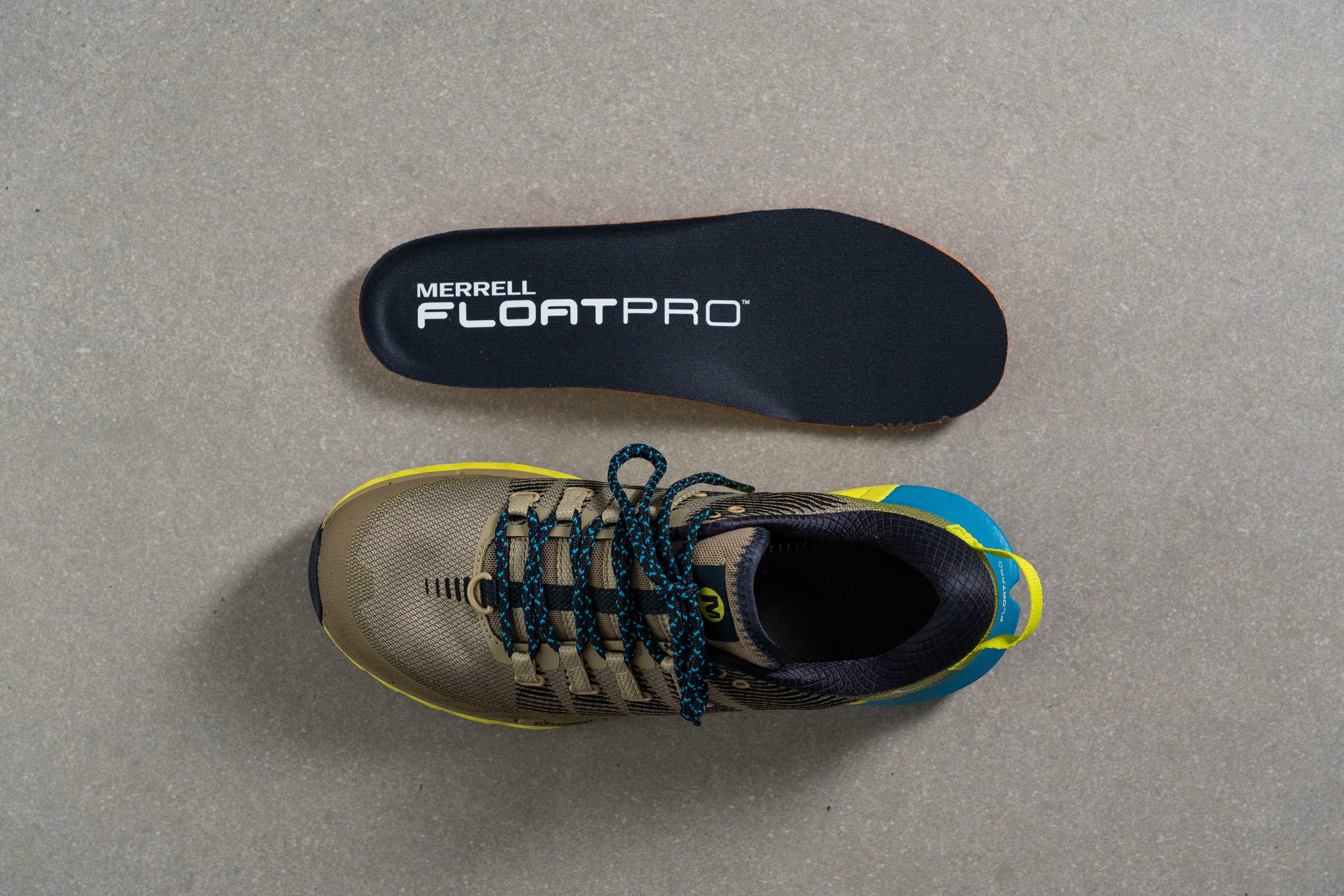
| Agility Peak 4 | Yes |
Midsole softness in cold (%)
With an upper that's less breathable, this shoe shines for winter hikes and runs. It gets even better—our tests showed that the FloatPro foam only gets 23% firmer in cold temperatures, which is a great result.
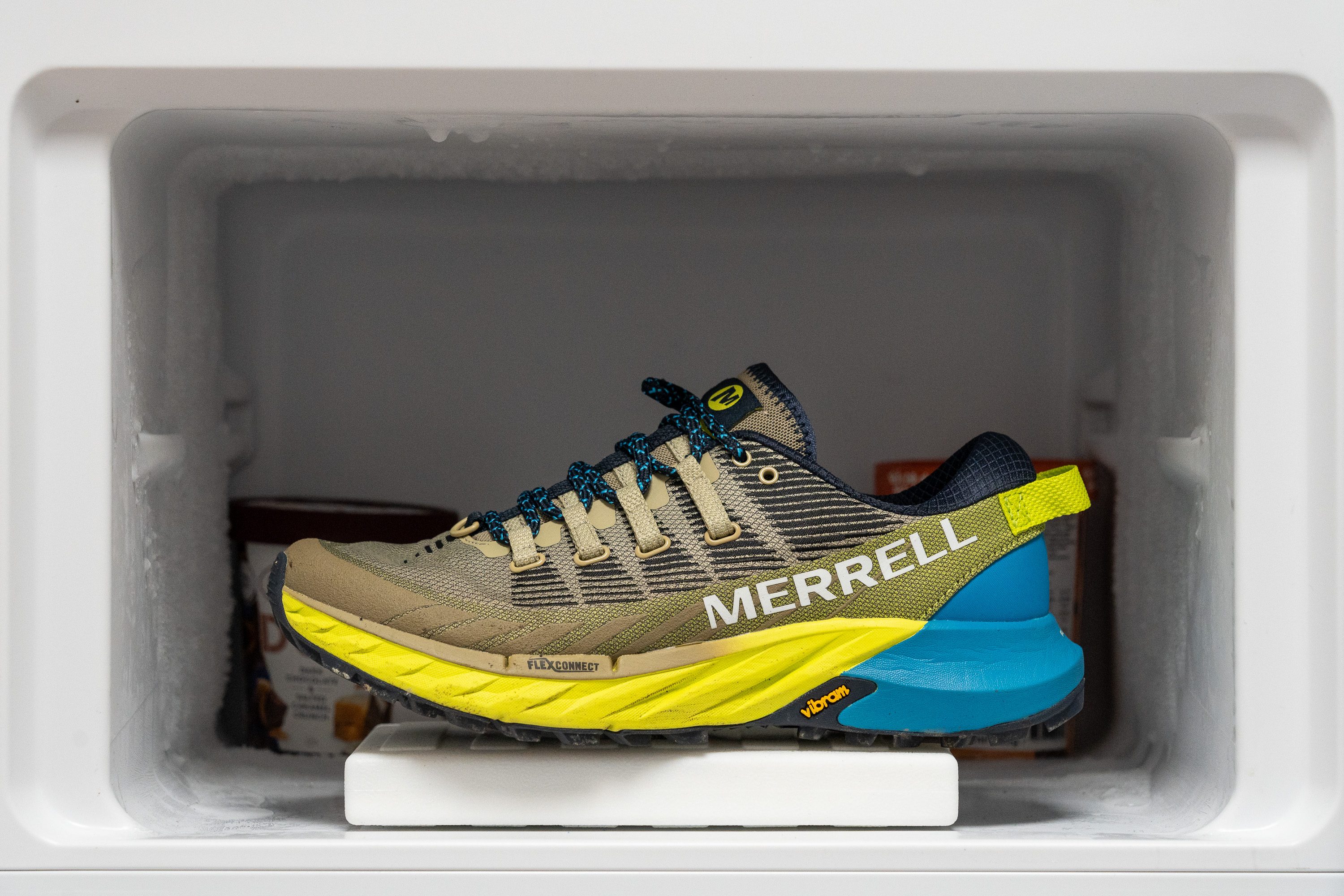
| Agility Peak 4 | 23% |
| Average | 26% |
Reflective elements
The Merrell Agility Peak 4 lacks reflective details, so it's not the best choice for night trail runs.
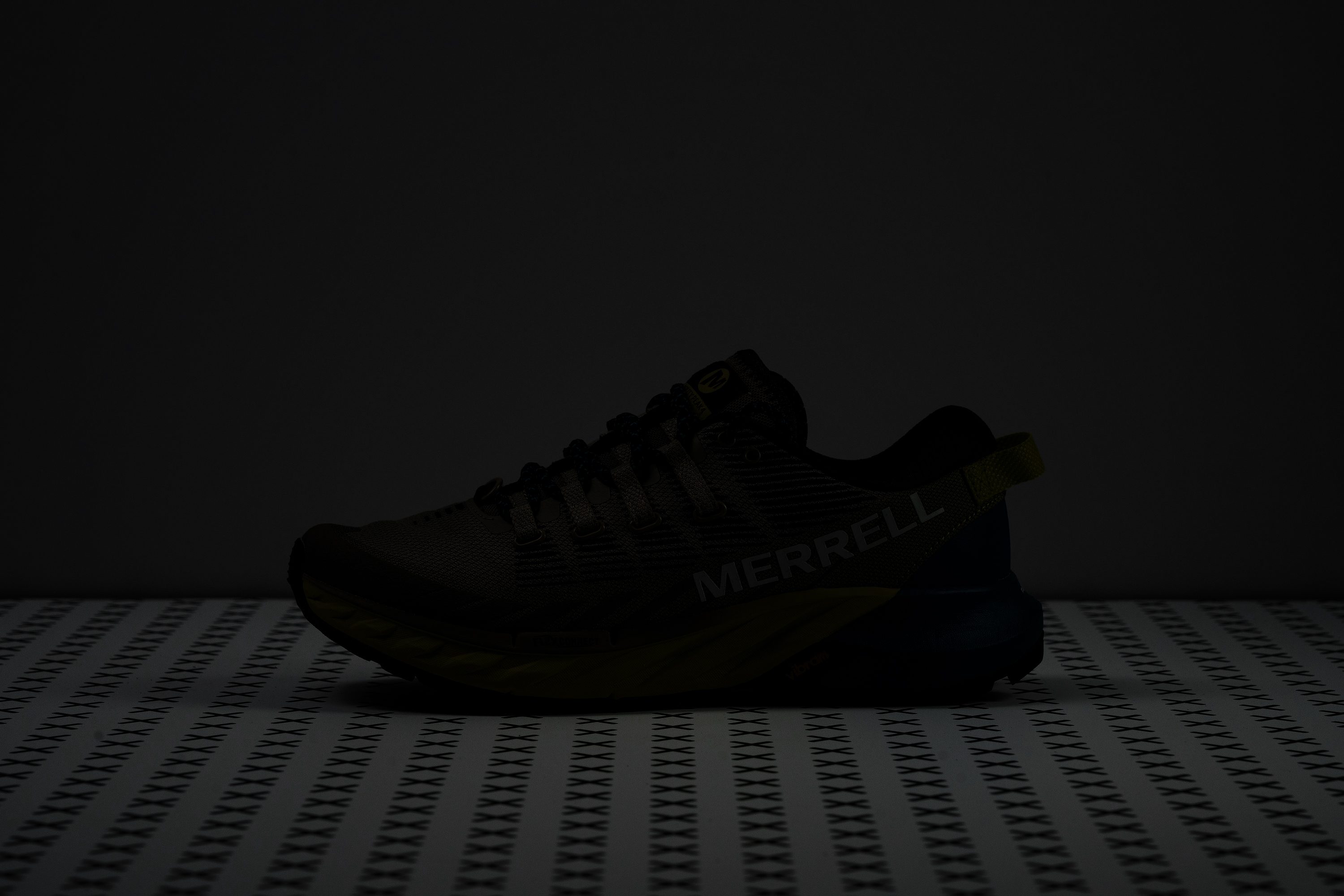
| Agility Peak 4 | No |
Tongue padding
The tongue has decent padding, but don't expect it to feel like a pillow between your foot and the instep.
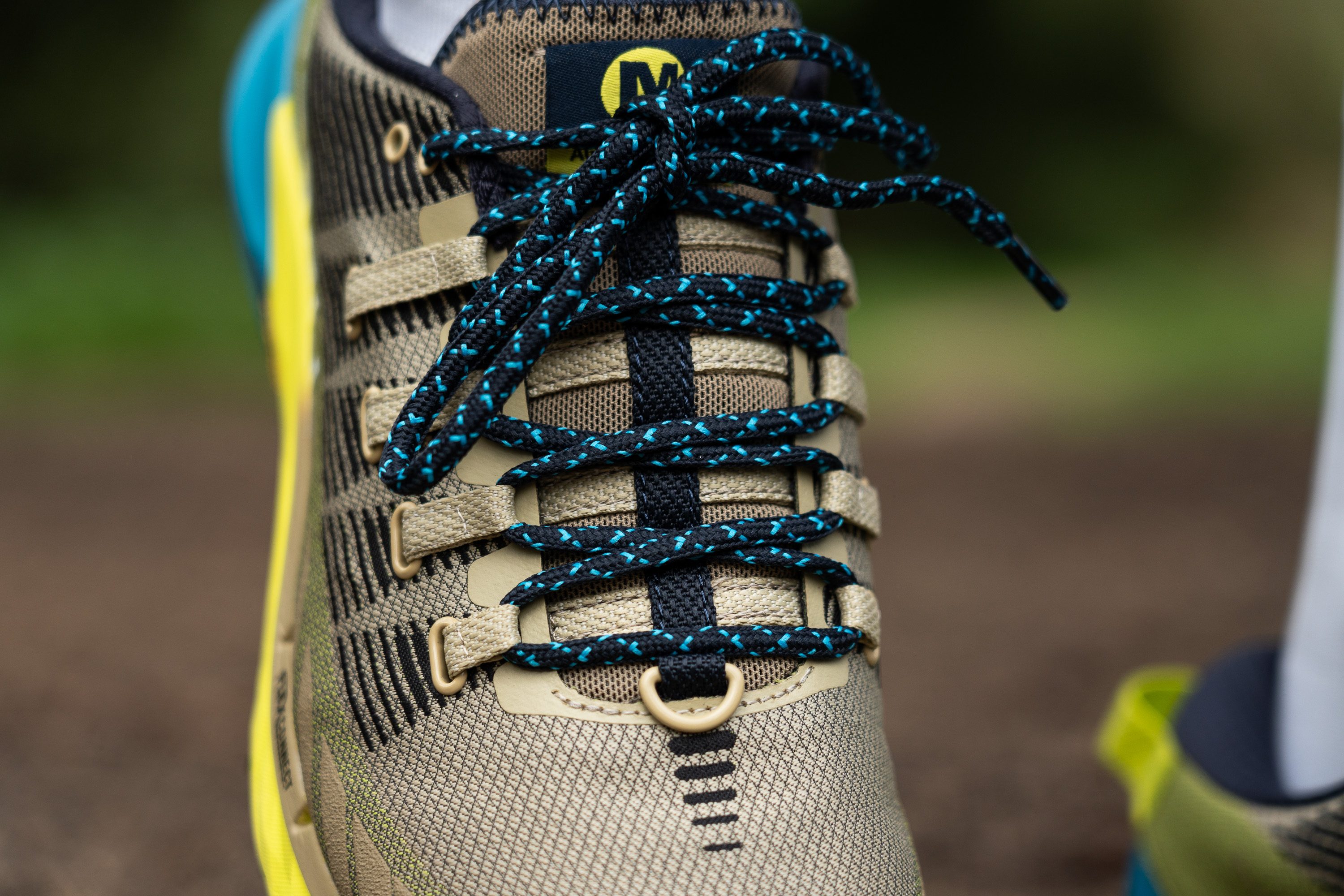
We measured it at 4.3 mm, which is quite a bit less than the average shoe. However, the tongue incorporates some extra layers that add a bit of cushion.
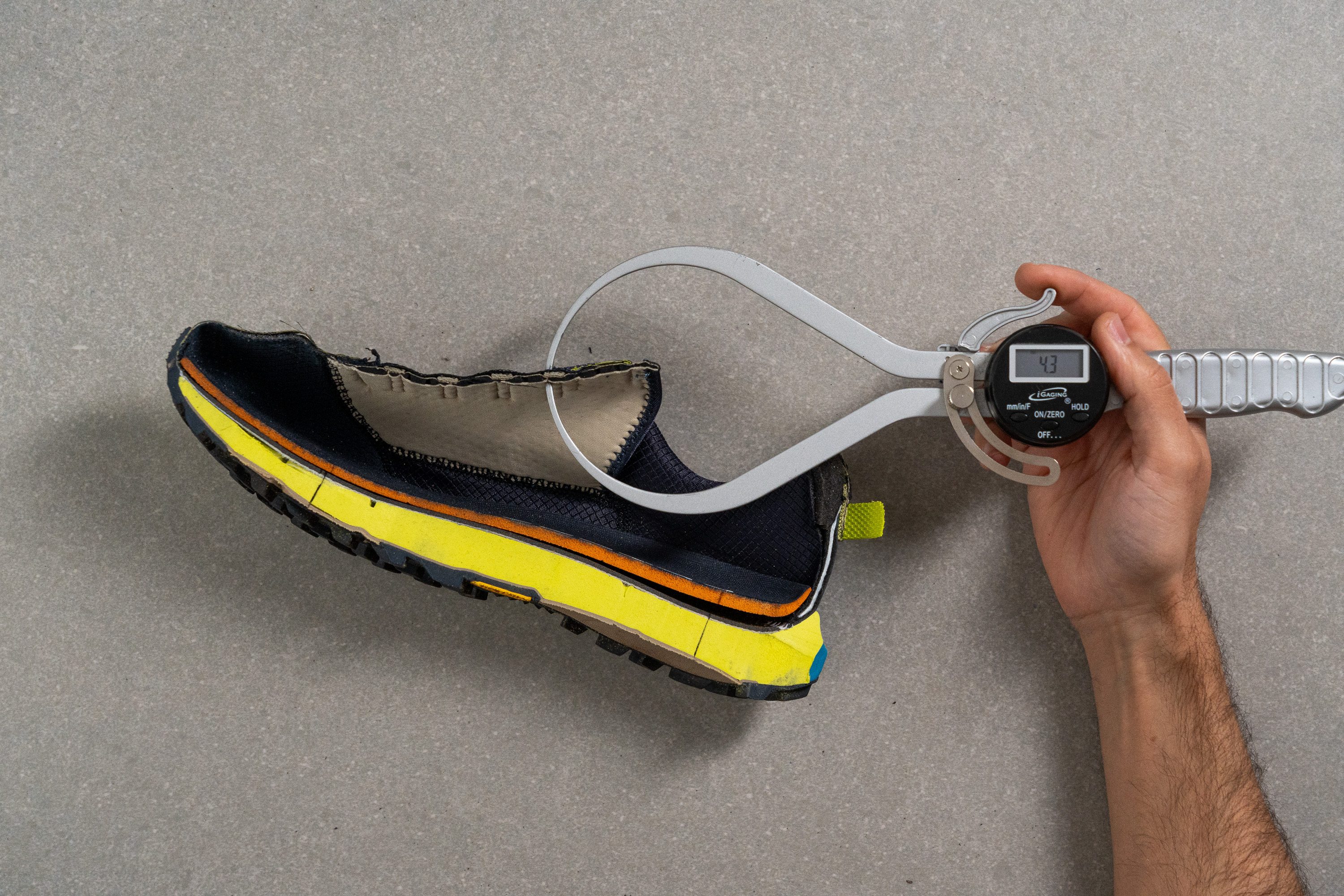
| Agility Peak 4 | 4.3 mm |
| Average | 6.4 mm |
Tongue: gusset type
The tongue is securely attached to the sides in a bootie style, effectively blocking any rocks or debris from sneaking into the shoe.
This is exactly the kind of feature we love to see in a proper trail running shoe!
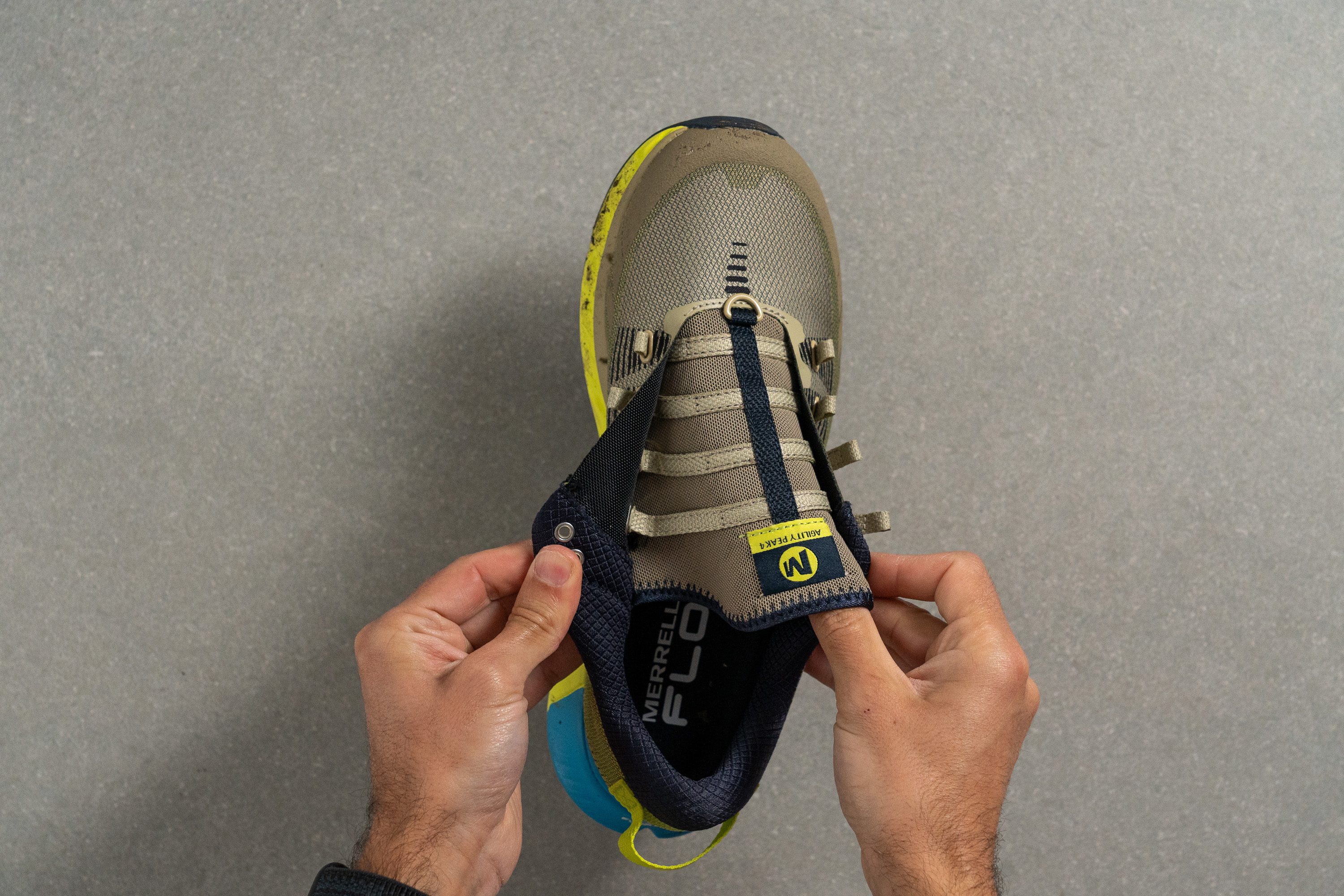
| Agility Peak 4 | Bootie |
Heel tab
We found a finger-loop, a horizontal pull tab on the heel, making it easier to slide our feet into the shoe.
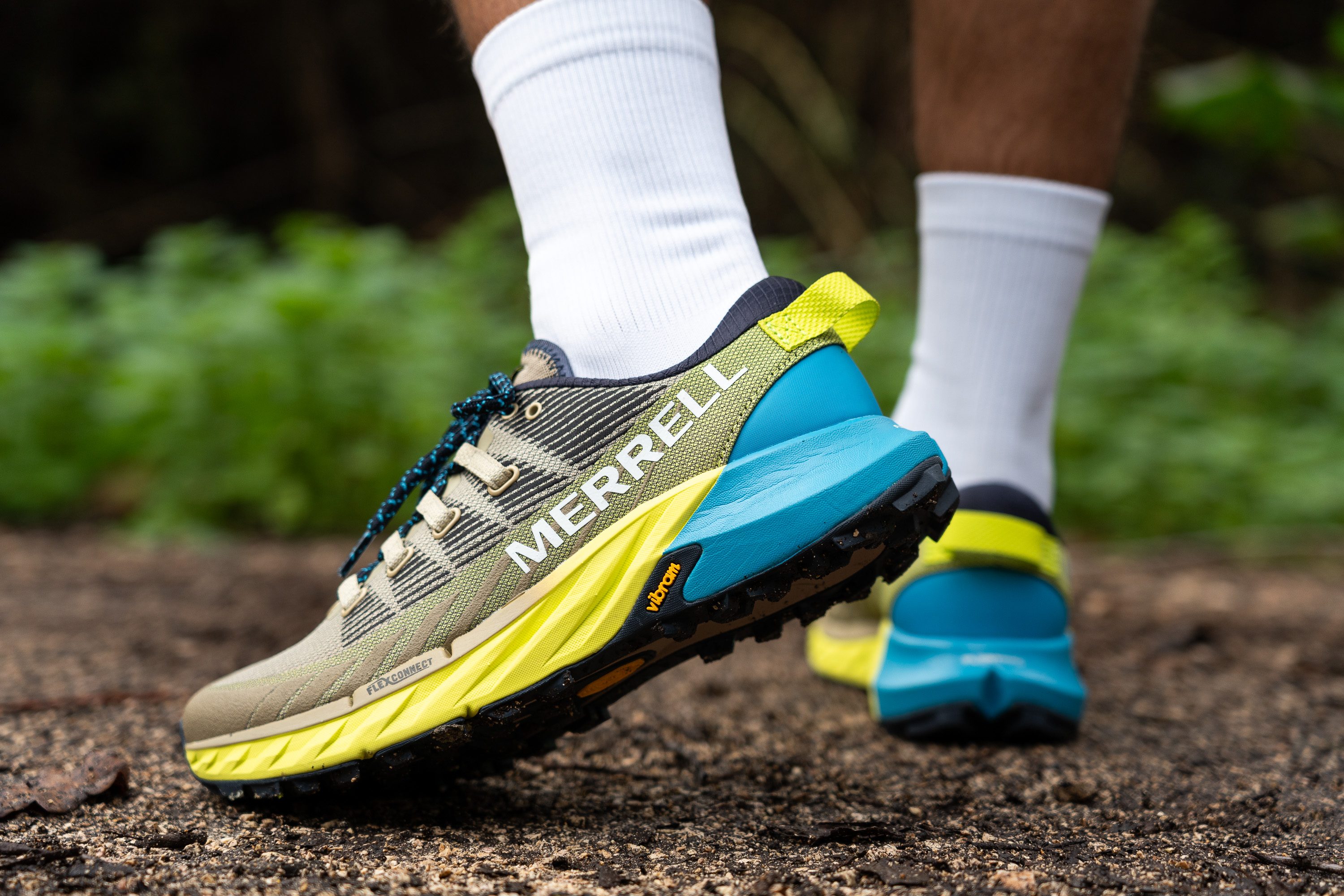
| Agility Peak 4 | Finger loop |

